#industry secret: most people think that all interpreters are US based but no there are hundreds of subsidiary agencies in Latinamerica
Explore tagged Tumblr posts
Text
The high-level prophecy interpreters all worked for the government or major corporations. They were the ones with the money, and the ones most likely to be the subject of a prophecy. Sometimes you'd have a multi-billionaire hire on a prophecy interpreter, but usually they just had one on retainer. The same went for celebrities who were famous enough to attract significant prophecies.
But at the lower level, there were prophecy interpreters who opened up their own firms, usually just one or two if they weren't in a major city. That was me: I had gotten in prophecy interpretation in college and ended up majoring in it after the Kepler Incident. I had my name on bus stops and billboards, and a single secretary in my employ who thankfully handled most of the phone calls.
In the field we sometimes divide the business up into three sectors based on timing. There's "prophecy impact", which is when we do a consultation right after the prophecy has been made, or at least sometime before it rears its head. Some prophecies are decades in the making, but people want to be told what to do about them. I hate that part of the job, personally, because there's not a whole lot to do, depending on the language. Plus the conversations are pretty repetitive: a guy hears a pretty clear-cut prophecy that he's going to die falling out of a plane, and he's begging for some way out, as though there's something I can do about it, as though I can tell him that prophecies are lairs sometimes. Prophecies are liars, but they're clever liars, hiding meanings inside words, only clear after they've passed. You can't escape prophecy, and at least half of "prophecy impact" clients explaining that fact to them.
The second sector is "prophetic immanence", when the client has a prophecy that they think is coming true. Sometimes this can be because there's a trigger phrase in the prophecy, a conditional that appears to have been met. One of the dirty secrets of the industry is that nine times out of the ten, people are mistaken: the nature of prophecy is such that you can't often pinpoint when the prophecy is nigh. In my opinion, you can judge a prophecy interpreter by how upfront they are about this. The weasels will milk their clients dry by pretending that every moment is a crisis moment.
It's the last sector that I find the most satisfaction from, which is why it's a disappointment that it's the least in demand. This is post facto prophecy interpretation. You're not trying to prevent anything, you're not formulating a reaction, you're just trying to figure out what happened and how it all fit together. These are clients that are in the aftermath of prophecy, or what they're pretty sure is the aftermath, and a lot of the time, they just want someone to talk to more than they want my specific expertise.
My client that day was an artist, a rising star who had a few very successful gallery showings. It had been prophesied that her older brother would accidentally kill her father, but it had been her instead. This wasn't a recent trauma, but the wound was clearly still there, so I tried to navigate it as carefully as I could.
"One of the things that makes prophecy tricky is ambiguity," I said gently. "There are some, outliers, that depend on pretty tortured readings. But in this case, I think it's just an alternate meaning. From what you gave me, the prophecy was specifically 'the child who first draws breath', and that's in reference to your career as an artist."
"That's stupid," she said. "He's two years older than me, would he really never have doodled a person drawing? Just a few lines indicating that something is coming out of their mouth?" Her hands were folded in her lap. They were curiously still, for someone who used her hands for a living, but maybe artists were like that, preserving the tools of their trade.
"It's stupid," I agreed. "But I do think it's entirely possible that his drawings didn't include anyone breathing, and that yours did."
"How can we know for sure?" she asked.
"We can't," I replied. "Though if we take for granted that the prophecy was fulfilled, and that you were the one to fulfill it, then we have to search for answers within the realm of what we know. And if you're not satisfied with that answer, then I need to spend some time searching for alternate meanings, to find some interpretation that lands better."
"I could understand it if I had some obsession with drawing breath," she said. "If I had done a series of paintings of visible breath escaping from a person's body, then that would make sense. But it's not that, it's the first to draw breath, and that's just ... I mean, doodles we did when we were children. It means nothing. We have no way to mark that. It wasn't pivotal."
I shrugged. "It is what it is." I use that phrase a lot. "There's a selection effect with prophecies. The ones we hear about are hugely ironic, they show the hand of fate, they warp and twist people. But many of them are just," I shrugged again. "Things that happened."
"My brother moved away," she said. "My father had kind of accepted it, probably from the moment we were born, or before that. He'd made peace with it, hadn't tried to fight it. But it was a hard thing to learn for my brother, and he'd just left to go to school a thousand miles away, and coming home was always stressful for him, because maybe this was when it was going to happen."
I nodded. "I can see where that would be difficult. How did he handle it?"
"Poorly," she sighed. "Dad was a good guy. My brother lost all that time, and it had always been a source of tension between them, not the death, but their perspective, you know? Dad preached acceptance, my brother wanted to avoid it, and so when my brother went out west, dad was disappointed. He said it was like losing his son, and that he'd have rather died than have that happen. So not only did my brother not have a close relationship with my dad because of the prophecy, it turns out that dad was right all along. It would have been better for everyone not to fight it."
"Maybe," I said. "In the business we don't counsel people not to fight prophecies. Sometimes it's the right thing to do."
"Well, sorry for wasting your time," she said. "Though I guess I'm paying by the hour, and I'm not going to apologize for something I paid for. So I'd like my apology back, please."
I smiled at her. "Certainly."
She stood up to go, and I marked the time so I could bill her later, but she paused for a moment. I put in the time all the same; so far as I was concerned, we were off the clock.
"Do you have any unresolved prophecies that you know of?" she asked.
"That's sort of a personal question," I said. "But I get it a lot, and if it might help you, I can share: I'm going to be eaten by an alligator."
"You're ... what?" she asked.
"An alligator?" I asked. "They live in swamps."
"And how are you going to be eaten by one?" she asked.
"Well, I don't know," I replied. "There's a chance I've dodged it already, or ... dodged it in the way that you can sometimes dodge an obvious reading." I held up my hand and showed her my pinky, or rather, my lack of pinky. "I went down to Florida, had my finger amputated, then fed it to three baby alligators under the supervision of a zoo keeper."
She stared at me. "And that works?" she finally asked.
"We'll see," I replied. "In general, yes, it's an approach with relatively good outcomes. A self-fulfilling prophecy. It's a peace of mind thing."
"But ... your finger?" she asked. She was looking at it. I sometimes thought that going with a toe would be better, or a chunk of flesh from somewhere else, but I had heard that losing a toe could interfere with balance. I had never regretted that it was a pinky finger.
"If I didn't avert the prophecy, I want to be the kind of guy who says 'oh, well that's funny'," I replied. "I think ... whatever helps you, you know? And now I don't need to stay up at night wondering how the hell it's going to happen. See, your father had it right, I think. You have to find a way to make peace with it. And this was what it took for me to make peace with mine. Though I have to admit that I'm not a fan of zoos, and I don't take vacations south of the Mason Dixon, so maybe I'm not as much at peace as I would like myself to believe."
"Huh," she said. She looked away from the missing finger and to my eyes. "Thank you for sharing that."
"It's okay if you think it's kooky," I replied.
"No," she said. "I was just ... thinking that if my brother had something like that, he might have had more time with dad before he passed."
I nodded. "You can share that story, if you think it will help. Sometimes it does."
When she left I went back to my computer, cruising the local news sites to see whether there had been any updates. I hadn't given her the best advice. My mind had been elsewhere.
A local guy had been busted for breeding reptiles without a license. I was sure it was nothing, but they hadn't said what specific reptiles it had been. It was probably nothing. I mean, a full-grown alligator escaping from custody, finding me, and managing to eat me was a little too much for me to believe.
But fate is a funny thing sometimes, and I was going to keep my eyes open.
691 notes
·
View notes
Text
lost in translation (ch 9)
just a running list of things i noted down for the translation of chapter 9, while watching the chn and eng versions side-by-side. there’s nothing as major as in my other “lost in translation” posts, but a still few translation errors/omissions and cultural notes that i wanted to write down
disclaimer: i am not fluent in chinese, so keep in mind that there will be mistakes. feel free to let me know if you have questions, concerns, or comments.
overall: like i said above, nothing stands out as a major accuracy error that i feel has seriously impacted characterization or plot understanding (well, maybe one for characterization). saw multiple instances of subject-verb agreement issues and some clunky sentences
any translations below the game screenshots are my own translation of the chinese text, based on the official translation but with edits (most important difference bolded).
9-2

...But to the people who don’t know the truth, doesn’t reporting it like this equate to washing themselves of any connection?
technically the translation can be correct, but i think it’s easy to (mis)interpret it as a “clear line” connecting Heirson and NXX, rather than separating them. it’s definitely how i read it at first, though later lines (example below) make it clear what the meaning should be

9-06

No problem. When we were kids, didn’t you always secretly slip me the things you didn’t like to eat?
kind of a small detail, but i feel like the original is even more charming. leftovers could just be a matter of practicality, but giving luke the things she doesn’t like shows even more of that childish willfulness (the word i want to use is 任性) and how much luke indulges rosa
9-08

Which means that the hospital working environment wasn’t actually all that perfect, and there were many times they were mistreated.
i guess this could come down to interpretation of the original, but i feel like the original sentence was more focused on pointing out the hospital’s issues, while the translation seems to be toning it down.
9-12
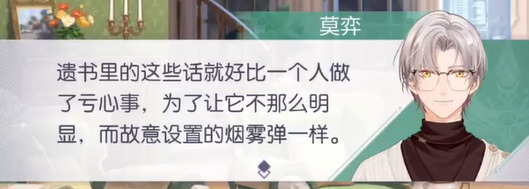
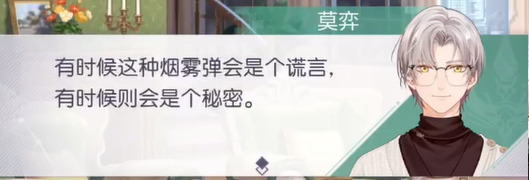
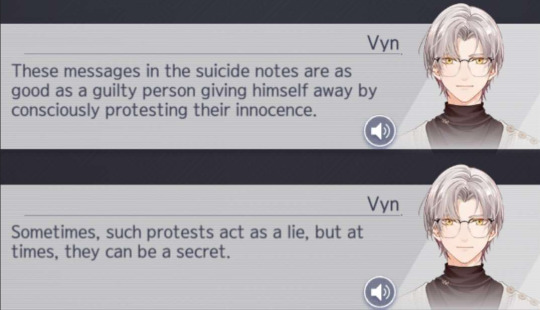
The messages in the suicide notes are like a smokescreen deliberately set up by a guilty person to help conceal what they’ve done.
Sometimes this smokescreen is a lie, and sometimes it is a secret.
i’m not sure why they changed the analogy to a more direct explanation.
9-14

Didn’t I tell you? When asking for a favor, you should use “gege” [哥哥, literally “older brother”].
so here’s the one requiring a cultural note: there are a variety of ways and terms for addressing people in chinese, often based on things like the person’s job or their relation to you. the little girl has been calling jerome “shushu” (叔叔) which literally means “uncle”, but is also the way for a child to address a man who is a generation above them.
jerome is (lightheartedly) telling her to call him “gege” instead, which is the form of address for a boy/man older than you but still in your generation. so he still wants to be seen as a younger person, and he’s telling the girl to flatter him by saying he’s young so he’ll be more willing to grant her favor. again, this feels cute and joking to me, especially since he braids her hair anyway.
and then she continues to call jerome “shushu” anyway, while marius gets a “gege” in the same sentence xD (it all gets translated as forms of “mister” in English)

and MC gets called “jiejie” (”older sister”, female equivalent of “gege”). translated as “lady” in English.

9-16

Marius immediately warns him with pretend-sternness.
English translation doesn’t seem to have “故作” in its translation, which means “to pretend/feign.”


“Pax Pharmaceutical is caught in this wave of doubt. CEO Marius von Hagen was attacked by an unidentified person during a banquet...”
even though marius does get questioned in this chapter, i... don’t think this part of the text said that Marius is under suspicion? more that pax is also impacted by the confidence crisis in the pharmacy industry.
9-18

Artem glares at the owner of the voice and plucks back his tie, then his face instantly darkens further.
some of the phrases of the sentence don’t have the subject explicitly stated, but i think it should be artem throughout

also a cultural note: “Do you believe in light?” is an online meme referring to the well-known children’s tv show Ultraman. but basically, this is probably intended as Artem having no idea what new meme the young interns are referencing, rather than a strangely philosophical question.
9-21

“Live on and try [it?]” (tiramisiyu’s translation, i pretty much would translate it the same way)
might be splitting hairs, since if the note is attached to the bottle, using the powder is implied; but the chinese message can be interpreted as explicitly indicating to try the powder. hm, i guess the more i think about it, the more that there’s enough room for interpretation in both versions that maybe this doesn’t need to be in the list.
#tears of themis#marius von hagen#jerome adams#luke pearce#tot rosa#tot translation#thoughts of themis#okay headache!! this wasn't intended to be titled ''lost in translation'' but then i spent so long on it that i decided it should be
18 notes
·
View notes
Text
Things I wish I could say at work as an Over the Phone Interpreter (OPI)
-I'm sorry, you have a very thick accent and I don't understand half of the things you are saying.
-Slow down! I'm taking notes here! I know that this script is burned into your brain, but it is not in mine. Go slower.
-Yeah, I get it, I'm sleepy and dead inside too... but at least I make an effort so you can understand me when I speak.
- Please open your mouth when speaking.
-Stop smashing that keyboard. It's dead already! Not to mention that your microphone is right there and you're hurting my ears 😒
- Ouch! (Every single time they throw something on their desk right next to the phone).
- Stop shuffling those papers/opening and closing drawers/moving furniture when speaking, I can't hear you over that!
- Please tell your co-workers to laugh/gossip somewhere else or just stop while you're on the phone... I can't hear you.
- I know that you feel great for understanding some Spanish words/sentences. But you called us (Interpretation Agency), let me do my job and don't speak on top of me (same thing applies for the LEPs -Limited English Person/People- that understand some words in English). It can be solved with a simple "Interpreter I'll let you know when you are needed".
- STOP BREATHING IN THE MICROPHONE! I was supposed to speak with a nurse/CS rep no with freaking Darth Vader.
- I can't hear you if you are standing far away from the phone. You don't speak as loud as you think.
- It would seem like you don't really care about your patient's/customer's answers. Oh, you do? Then why don't you let me finish tell you what they are saying?!
#work#OPI#over the phone interpretation#interpreter#english#spanish#if you use an OPI agency and commit any of these crimes shame on you! shame on your cow!#industry secret: most people think that all interpreters are US based but no there are hundreds of subsidiary agencies in Latinamerica#and they don't hire interpreters but bilingual people (such as me)#we get overworked and underpaid of course
1 note
·
View note
Text
Okay so I’m going to try out writing my reactions/feelings for everything I read in a month. Some of the stuff I read isn’t captured by Goodreads, and some of it I have opinions on that I want to get out but don’t want to post on GR for all the world to see A note that for this month I mostly worked from home post surgery. I do my of my book consumption via audiobook in the car so this is a relatively light month.
So here we go for April!
FICTION
The Body Without Organs @Natsinator (AO3) I first saw Space Odyssey 2001 in 8th grade and I had two takeaways: 1) I would like to do LSD 2) HAL 9000 is kinda hot Once a robotfucker, always a robotfucker I guess. Anyway, this is good! Solid exploration of the ship mind concept. Some quality homosexual subtext. Better writing than the Arthur C. Clarke novel (truly I think he is overrated - his best work is definitely Childhood’s End which is usually not discussed when people bring up his work). The Last Shadow Orson Scott Card OSC is unambiguously a bad person. I have never paid money for any of his work (I use the library) but I understand that even just reading his work is tacit support. It sucks that Ender’s Game was so damn good. Even Ender’s Shadow and I would say up to even Children of the Mind are pretty solid work. Everything after that goes further and further downhill. Last Shadow is supposedly (HOPEFULLY!) the final book. And oh boy does it suck! Freaky plot point that goes on and on about the butt and associated bodily functions of a little boy character. Why does OSC talk about little boy butts so much? What’s up with that?? Racist about Asian women. He really draws upon the harmful stereotype of Asian women being the perfect wives/mothers/homekeepers. They really have no meaningful agency beyond that. Building on the last point, OSC definitely sees it as the greatest good in life to have children. Thus women who don’t want children don’t exist in his books. There’s even a fucking hyper intelligent bird that talks about having children. Even if there wasn’t all that shit mentioned above - it was a badly assembled book. Plot threads that were set up in books prior never go anywhere. There are too many new tertiary characters we don’t care about because we hardly know anything about them. The main conflict of the book is solved quickly and easily with little pay off. Was there anything good in this book? Hiram is now and immortal holographic AI. That’s kind of a cool concept but it doesn’t go anywhere at all. But the best things is that I am finally free of this series. Finally fucking free!!
Bonus - I didn’t actually read Empire of the Ants by Bernard Werber but I ordered it via ILL for 98 to read. 98 gave me the summary and I read a bit of it out loud for them. I thought it was going to be a middle grades book like Redwall or Watership down but I don’t think this book’s intended target audience was children. I think it’s supposed to be more in the Michael Crichton sphere of ‘thriller pop science.’ Some of the stuff from the ants perspective is really clever (like how they view the mini golf course). The author definitely has some views that would be considered ecofascist. There’s a weird spiritual? metaphysical? twist at the end that isn’t really pulled off.
NONFICTION
Futureface: A Family Mystery, an Epic Quest, and the Secret to Belonging Alex Wagner The investigation of the DNA testing kit industry is really good. She had a good exploration on how such companies advertise themselves (learn how global you are!), vs the companies original intent (help Mormons find and baptize their dead ancestors), vs how the general public really interprets the tests (latching onto one or two unique/special things). I like her discussion of the flaws of the industries (most of the sample pops are European bc those descendant populations are whos paying for this kits, the ethnicities reported are based off of contemporary boundaries which are not what you own ancestors would have necessarily known or understood). I think if she had put that section in the front half of the book and centered it it would have been a much more solid work. Her more traditional genealogical research is probably too personal in-the-weeds for a lot of people to care about. The stuff about the Burmese political climate was good though. Information Doesn't Want to Be Free: Laws for the Internet Age Cory Doctorow Suffers from ‘could have been an article’ disease. Way too fucking long for something that just hammers the same point over and over and over. His argument that current copyright law doesn’t really work in the modern world is something I largely agree with but unless you are a copyright scholar this book is just too long for what it’s accomplishing. Kill All Normies: Online Culture Wars from 4chan and Tumblr to Trump and the Alt-Right Angela Nagle This is bad. Don’t read this. I think I found it by searching for ‘anthropology’ in the library catalog. That’s pretty slim pickings so I got this without reading too much about it. It’s not an ethnography, that’s for sure. I thought it would be about how the internet can be a force of isolation and hyper insular communities that drive things like Qanon and deaths of despair. It's not about that. Nagle has a weird juxtaposition between the altright and tumblr culture, as if those things are somehow comparable. Jan 6ers really have nothing in common with 14 year olds using faeself pronouns but she gives them both the same treatment. There’s also a bizarre snub about video game journalism in here. Nothing is cited in this book. Apparently in the print addition there are a lot of typos. No idea how this got an audiobook produced. Arriving Today: From Factory to Front Door-Why Everything Has Changed About How and What We Buy Christopher Mims Supply chain step by step investigation. Would have loved for this book to come out like 2 or 3 years down the line to actually properly see what a post-covid supply chain looks like once things settle more. Good discussion on automation. Unmentionable: The Victorian Lady's Guide to Sex, Marriage, and Manners Therese Oneill Weird fucking book. I’ve never seen a history book written in second person before. I get that this is supposed to appeal to women who read Victorian romance, but it is off putting to almost anyone else in the tone. The book puts you in the place as if you were an upper class, white, Victorian Era woman in England. A very hard book to enjoy for me because of that for my own personal Gender reasons. I think the second person POV also stymies the book in that it limits the scope of who can be talked about and what life was like for women during the era who were not white, well to do, etc. Do we really need a deep drive on the women we already have the most information on? It does seem to be comprehensively researched. Nothing factual in the book seems incorrect as far as I know.
Index, A History of the: A Bookish Adventure from Medieval Manuscripts to the Digital Age Dennis Duncan Amazed that a book this specific got an audiobook made and a library system that I’m in bought a license to it. But, I supposed if anyone is going to be interested in this book it’s going to be someone with a library sciences degree. Even for being so hyper-specific, I think this book is good for what it is. Interesting investigation of how the way of organizing information has changed over time and how people perceive how information should be sorted. The author casually mentions that in the medieval era that it was way more common for people to read while moving their lips which is something that people are made fun of for doing now! Interesting that seems to be the default way of reading back then and it has since shifted towards silent reading. What factors played into that? More legible books? Capitalism driving focus on the individual vs community (if you read out loud it could be sharing with the people around you)? Would love to know when that shift happened temporally.
2 notes
·
View notes
Note
I said there would be a part three on the WTHTD video and I decided to keep it quiet a couple days ago until my gut told me to post.
Please stick with this read as it will get deep into lore and connections
My conspiracy on the scorpion tattoo part two:
In the WDHTDANCE video
there’s two girls; one blonde and brunette.
At first, a regular person might pass it off as
“Oh, two girls in the background! MV standards.”
Sadly, no.
It’s Juliet and Angie before and after Andy found out about Scientology and their wickedness.
Let me explain and backtrack the beginning theory of the music video.
It starts with Andy walking into a hotel building with a monster holding the door for him. He walks into a dark movie theatre room that relives his past memories, AKA the AUDITING ROOM or what other people refer to as the *fake* Akashic records room. (A spiritual place that stores memories that many fake spiritual gurus love to talk about in *awakening*)
What’s with this room, you ask? Scientology is known to bring people into rooms to “clean their memories and get their stories straight.”
While Andy is watching on the screen, there’s two innocent girls, as previously mentioned before, living their best life and looking flirty at a party. Sources say Andy and Juliet met at parties/festivals back in the day with Juliets family near always, which includes her sister who was trying to become an influencer as well.
Throughout the video shot, Andy’s being watched by this monster man in the background, making sure Andy is watching attentively and he’s looking at the scenes worried in regret. Furthermore, these two girls turn into hideous morphed demonic beings at the foot of this monster.
Then shows the shot of an innocent woman drowning in water.
“Oh how don’t you drown in a rain storm”
He’s asking Juliet why she isn’t exposed from the spotlight from all the shit she’s put herself in. Hint, nobody knows who the fuck she is and Andy’s asking why karma doesn’t punish her yet. (It’s coming! It’s already been hitting her!) Why hasn’t she drowned in all the fucked up situations she’s created through the years.
During the auditing process, Andy is being purged of Juliet and the Simms family secret of darkness so he can view Juliet as an angel,
like how the women think they are the monster’s little wh*re princess (excuse my language) because they think THAT monster is in control of Andy’s wording and thoughts during the auditing process. Aka Scientology, and Juliet’s father.
I believe Andy is watching carefully around their father because they come from money as well as
Jeff is an A class narcissist himself and says “peace is everything when you can fuck everyone over!” and tries to make Andy something he’s not, which is an asshole.
We don’t have to dance, is a song toward Juliet saying I’m not going to make this relationship something it’s not up to be. I know who you truly are and it’s not something that I’m going to keep loving you toward, so we can still be in a relationship because I’m stuck with you but I’m not ever going to love you (.) like I did when I was young and naive ever again.
Record scratch (auditing) ; Steve Miller Band (the joker is one of their classics)
Tattooed necks and tattooed hands
(Facade to hide in and be the person that they want him to be, so he tries to be comfortable as much as he can. ALSO, the song THE JOKER BY STEVE MILLER BAND GOES INTO DETAIL ABOUT ALWAYS BEING IN MASKED PERSONALITIES and being seen differently by everyone, which Andy feels like)
Oh, how don't you drown in a rain storm?
(Previous statement above ⬆️)
Fresh regrets, vodka sweats
(He regrets meeting her and getting married so soon and he drowns her out with vodka getting too drunk and having night terrors)
The sun is down and we're bound to get
Exhausted and so far from the shore
(I think that line perfectly states how far they’ve tried to drive him out of his “let’s create a better world” mentality & bright eyed personality into feeling exhausted and enslaved, overall not like the inner child he once had. Fucking Juliet being an older cougar and taking advantage of Andy’s youth while his parents sold him out and Ashley was a weirdo who gained half the rights to the band, not only that but his record label’s pressure, band mates, crew, friends (which are mostly Scientologists) to always go along the dotted lines like a script, literally.) He was only 18-20! A baby! who was groomed up by old Hollywood cults for selling him a dream that left him almost dead.)
You're never gonna get it
I'm a hazard to myself
I'll break it to you easy
This is hell, this is hell
You're looking and whispering
You think I'm someone else
This is hell, yes.
Literal hell.
(The fan base used to think Andy was this confident almighty saviour because he cared about us, his young sweet heart cared about helping people and he was drowning in regret and shame from the fake industry and kinfolk behind him making him feel left out, delusional, and not belonging. He was feeling a moment of weakness in these lyrics and had to put on a facade that he was some big seductive rocker dude for financial and status sake, which in multiple interviews he feels bad about because HE HAD TO DO THAT out of survival mode and not because he wanted to! Now, today he’s seasoned and getting in control)
We don't have to talk
We don't have to dance
We don't have to smile
We don't have to make friends
It's so nice to meet you,
Let's never meet again
We don't have to talk
We don't have to dance
We don't have to dance
(This is basically an ode to meeting Juliet for the first time. Or getting into a relationship with her in the beginning. He’s writing what he now would have done instead of marrying her in 2012. Didn’t they say they both hated each other when they first met? He wanted to listen to his gut instincts and he felt deep regret in those lyrics)
Bottles smash, I raise my hand
How can you all even stand it
Why is there joy in this poison, oh
Faking smiles and confidence
Driving miles to capture this excitement
I can't take anymore, oh
(He’s asking why isn’t anyone caring about fake people including literally everyone he’s surrounded by, including us.
Why we used to not care about diving into the abuse and delusional shows everyone put out there, fake smiles and fake personas to keep fans alive and happy, which is coincidentally the most popular BVB was.
I wish Andy knew that for us, it wasn’t fake and that even though he was depressed and angry inside and still showed up for BVB army is a very selfless act, because he wasn’t forced to be nice to anyone but only put on a stage act by management.
Now he’s really shining and we get to see the person he has always been for us, a neighborly seasoned person who sings his truth and we, as BVB army fans, relate to the sad darkness and happiness overcoming it too.
He’s real and always has been, even if he’s had to hide and mask for his protection.
He gained popularity and support because he was authentically himself and showing up for him when he felt the shittiest (even when he thinks he didn’t handle it correctly with fighting and alcoholism,) still he showed up and gave everything in authenticity and pure emotion, Andy style. I think he’s come to conclusion that his stage presence is something special outside of his personality and that it’s okay to express your soul on stage even if it’s changing, he’s coming back to who he’s always been inside. I think he’s channeling it in such a badass empowered way on the IN BETWEEN tour.
Congrats Andy! That man IS a true soul warrior.
Dude was fighting predators, groomers, and multiple cults by himself and still showed up (AND bettered, healed, unlearned things about his surroundings and himself) even when he felt isolated and alone! Props to Andy!
I personally interpret the scorpion tattoo as death and not forgetting to go back to the place that he was left FOR DEAD even if he feels scared or lonely.
You’re not alone, Andy! We are here and we see you!
I’m so proud of him. He’s such a diamond in the rough. I’m proud to be a supporter and recognize what he’s done for himself and how it translates into his art.
.
7 notes
·
View notes
Text
Star Wars (1977); AFI #13
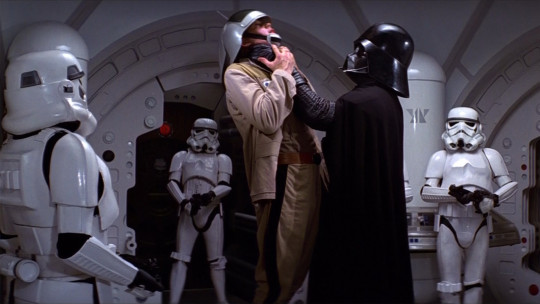


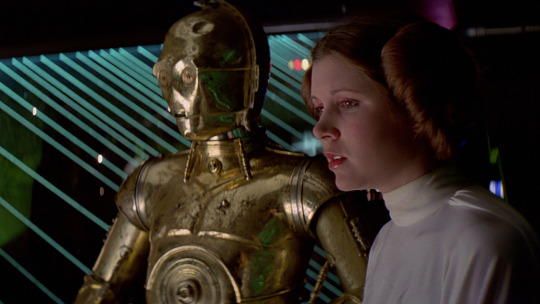

In honor of May 4th and the original movie that started it all, the group reviewed Star Wars (1977). Nominated for 10 Academy Awards and winning 6 with one extra special achievement award for Sound, this is perhaps the most highly decorated science fiction movie of all time. The special effects and the music were especially moving making the Star Wars experience something amazing to behold. I was lucky enough to see one of the re-releases in the theatre back in the mid 80s. In fact, I might well have seen the film 100 times over my life. The music might be the most well known soundtrack globally. With inflation, this is the 4th highest grossing film of all time. It is truly a fantastic work and I would like to now spoil it for anyone who hasn't seen it. Let me start with the usual:
SPOILER WARNING!!! I DON'T THINK THERE ARE MANY WHO HAVE NOT SEEN THE FILM, BUT FOR THOSE FEW THAT DON'T KNOW, I AM GOING TO RUIN THE PLOT!!! STOP NOW AND GO WATCH IF YOU HAVEN'T ALREADY!!!
--------------------------------------------------------------------------
Amid a galactic civil war, Rebel Alliance spies have stolen plans to the Galactic Empire's Death Star, a massive space station capable of destroying an entire planet. Imperial Senator Princess Leia of Alderaan (Carrie Fisher), secretly one of the Rebellion's leaders, has obtained its schematics (this entire effort was originally a throwaway concept but was completely fleshed out in Rogue One almost 40 years later) , but her starship is intercepted by an Imperial Star Destroyer under the command of the ruthless Darth Vader (acted by David Prowse and voiced by James Earl Jones). The movie is just starting and the odds against the rebels are shown by the scale of the two ships. Before she is captured, Leia hides the plans in the memory of an astromech droid called R2-D2 (Kenny Baker), who flees in an escape pod to the desert planet Tatooine accompanied by protocol droid C-3PO (Anthony Daniels).
The droids are captured by Jawa traders (little shiny eyed beings who are now meme legends), who sell them to moisture farmers Owen and Beru Lars and their nephew Luke Skywalker (Mark Hamill). While Luke is cleaning R2-D2, part of a holographic recording of Leia starts playing a message for Obi-Wan Kenobi where she requests his help ("Help me Obi-Wan Kenobi, you're my only hope!"). Later, after Luke finds R2-D2 missing, he is attacked by scavenging Sand People while searching for him, but is rescued by elderly hermit "Old Ben" Kenobi (Sir Alec Guinness), an acquaintance of Luke's, who reveals that "Obi-Wan" is his true name. Obi-Wan tells Luke of his days as one of the Jedi Knights, the former peacekeepers of the Galactic Republic who drew mystical abilities from a metaphysical energy field known as "the Force", but were ultimately hunted to near-extinction by the Empire. Luke learns that his father fought alongside Obi-Wan as a Jedi Knight during the Clone Wars (another throwaway concept that was eventually fleshed out) until Vader, Obi-Wan's former pupil, turned to the dark side of the Force and murdered him. Obi-Wan presents Luke with his father's old lightsaber, the signature weapon of Jedi Knights. The connection between Darth Vader and Luke's father is explored in depth during the next eight films.
R2-D2 plays Leia's full message, in which she begs Obi-Wan to take the Death Star plans to her home planet of Alderaan and give them to her father, a fellow veteran, for analysis. Although Luke initially declines Obi-Wan's offer to accompany him to Alderaan and learn the ways of the Force, he is left with no choice after discovering that Imperial stormtroopers have killed his aunt and uncle and destroyed their farm in their search for the droids (cue the Academy and Grammy Award winning theme music composed by John Williams). Traveling to a cantina in Mos Eisley to search for transport, Luke and Obi-Wan hire Han Solo (Harrison Ford), a smuggler with a price on his head due to his debt to local mobster Jabba the Hutt. Pursued by stormtroopers, Obi-Wan, Luke, R2-D2 and C-3PO flee Tatooine with Han and his Wookiee co-pilot Chewbacca (Peter Mayhew) on their ship the Millennium Falcon. As they reach the planet's orbit, two Star Destroyers try to intercept them, but Han is able to jump to hyperspace by reaching lightspeed.
Before the Falcon can reach Alderaan, Death Star commander Grand Moff Tarkin (Peter Cushing) interrogates Leia about the location of the Rebels's secret base, with the threat of destroying her home planet, and, when she answers that the base is on Dantooine, he orders Alderaan destroyed simply as a show of force. As the group arrives in the asteroid field that now stands in place of Alderaan, Han spots an Imperial TIE fighter and is taunted into chasing it and shooting it down, allowing the Falcon to be captured by the space station's tractor beam. Inside the Death Star, Obi-Wan attempts to disable the tractor beam, and Luke persuades Han and Chewbacca to help him rescue Leia after discovering that she is scheduled to be executed. After disabling the tractor beam, Obi-Wan sacrifices his life in an epic lightsaber duel with Vader, allowing the rest of the group to escape the Death Star with Leia. Using a tracking device, the Empire tracks the Falcon to the hidden Rebel base.
Leia's schematics reveal a hidden weakness in the Death Star's thermal exhaust port, which could allow the Rebels to trigger a chain reaction in its main reactor with a precise torpedo strike. While Han abandons the Rebels after collecting his reward for rescuing Leia, Luke joins their starfighter squadron in a desperate attack against the approaching Death Star. In the ensuing battle, the Rebels suffer heavy losses as Vader leads a squadron of TIE fighters against them, but Han unexpectedly returns to aid them in the Falcon, narrowly managing to save Luke before Vader can shoot him down. Guided by the disembodied voice of Obi-Wan's spirit, Luke turns off his targeting computer and uses the Force to aim his torpedoes into the exhaust port, destroying the Death Star moments before it fires on the Rebel base. In a triumphant ceremony at the base, Leia awards Luke and Han medals for their heroism.
--------------------------------------------------------------------------
I want to explain the connection between this movie and the Joseph Campbell version of the hero's journey that so many people have pointed out. This journey starts out with a call to adventure that is refused and then forced (Luke is given an opportunity to leave, he declines, the death of his family pushes him forward, he leaves with his team). Campbell then predicts an initiation that involves meeting a woman and gaining weapons, a meeting with an incredible power, and an achievement of the hero's power (goes to star destroyer, meets Vader and loses Obi-Wan, gains power over force). The story ends with a refusal, a magic flight, a rescue from without, and a hero's return (Luke goes to attack the Death Star, Han refuses and then eventually saves him, and the day is saved so the heroes are rewarded). It is a story that is called the Monomyth and has been recognized in Greek myths that are thousands of years old. It is a good story that has been proven to work and it makes for one of the most enjoyable movies of all time.
There was some negative opinions of the film because it is such a simple old story that became extremely popular and film goers would no longer be interested in intelligent thinking movies. It is kind of the truth because blockbuster summer films are full of explosions. The highest grossing films since then have tended to be highly explosive action films. Films like Star Wars, Jaws, and Indiana Jones are a lot of fun, but they are not super deep. They are easy to understand at surface level, but they can also be interpreted to mean much more significant things. The choice of the viewer about whether the story has deep inner meaning or is just the Odyssey in space is personal and likely colors opinions about how good it is. Some people think it is stupid fun while others have actually formed religions around the idea of the force.
One thing is for certain, the formula worked amazingly well for a large group of people and this made movie producers want to copy it. This is what is generally called a watershed moment because the look of movies changed significantly. There were so many more space operas and they all had that worn post-apocalyptic look to them. Star Wars and Mad Max combined to give a different look of what futuristic was. There was advanced tech in some cases, but there was a scorched Earth that had run out of resources and people suffered. Think about how many movies and television shows there are that have come out since the 80s and combine industrial tech for space and distressed almost Western appearances for the planets. The movie changed the way many people see the future.
One thing that is inarguably great was the score. I am not going to try and describe it with words, I am just going to put links to the different themes here so you can hear for yourself:
Star Wars Main Theme (Full) - YouTube
Star Wars- The Imperial March (Darth Vader's Theme) - YouTube
Princess Leia's Theme - YouTube
Star Wars Episode IV A New Hope (1977) Soundtrack 11 Cantina Band - YouTube
This is somewhat strange for the AFI so I went back and checked, but I believe that this is the only film with a ranked villain (Darth Vader), hero (Han Solo), and theme song (Main Theme). Even if it is somewhat simplistic from some perspectives, the story and the songs and the sounds and the characters speak to those who watch it. Seeing the movie is an incredible experience and I envy those who get to see it for the first time.
I am a big fan of the original Star Wars trilogy and I could completely nerd out going over all of the little things throughout the movie, but this is not a deep dive but instead an overall review. So does it belong on the AFI top 100? Maybe more than any other movie. It is an epic tale that changed the way movies were made across multiple genres. We could probably look at all science fiction films and put them as before or after this one. It is an important piece of American film and (no matter what anyone thinks of the other Star Wars films or George Lucas) it is a masterpiece. Would I recommend it? I cannot say yes enough. It is part of my culture as a California movie nerd and understanding this film is understanding some of the basic knowledge I grew up with. All sticks are swung around like light sabers. If I say "Princess Leia hair," everyone around here knows exactly what I mean. If something is impossible but still needs to be done, we tell people to use the force. I have lived in the Bay Area for 20 years and I can still reference a location by how close it is to Skywalker Ranch were George Lucas worked on movies. Please check out this film and you will know why I am such a fan of movies.
#star wars#a new hope#use the force#john williams#film score#introvert#introverts#movie review#award winning films#special effects
14 notes
·
View notes
Text
The History Behind “Useless Italy”
Introduction
This post will go into detail on the World War II era history behind the stereotypes that defines Italy’s character and his relationship with Germany. Both during and after covering the history, I’ll go into how Italy’s character reflects that history and point out some inaccuracies in regards to him and his relationship with Germany (Spoilers: There’s a lot). The point of this post isn’t to condemn Hetalia, it’s to inform the people reading this post. The core of the series, and even the name, come from how useless Italy is portrayed as. When consuming this sort of content, I think the actual background behind it is worth knowing. Hetalia is a lighthearted series in large part about stereotypes, but stereotypes can have some very not lighthearted origins. It’s also true that if you’re a Hetalia fan, and you never really look into this history, you’ve been massively misinformed. Hetalia can serve as inspiration to look more into history, but it is not to be treated as a legitimate source for learning history.
One extra note. For most of this post, in regards to Hetalia, I’ll be talking about Italy as in the titular character who represents northern Italy and not Romano. I will briefly bring up Romano as well, but his existence doesn’t detract from anything said here.
Translated panels are taken both from Hetarchive and the Tokyopop translation of volume 1.
The Historical Background
Italy’s character seems to largely be based on stereotypes that Italy’s blunders during World War II were a result of character flaws such as cowardice on the part of Italian soldiers. Factually, however, these stereotypes don’t seem to hold much truth to them. This isn’t something I’ll spend too much time going into detail on, but the actual reasons Italy struggled during WWII has to do with factors such as its involvement in wars in Spain and Africa which came before WWII, lack of resources, and lacking in industrialization. Before even entering the war, it was understood that Italy wouldn’t be prepared for a major war until 1943.

Adding onto the practical reasons mentioned above, Italians really didn’t want to enter the war.
“In fact, few Italians – including Mussolini and Ciano – had much taste for either the war or their ally, and the Italians continued to build fortifications in the Tyrol and contest German influence in the Balkans.” (Understanding Defeat: Reappraising Italy’s Role in World War II)

So why would Italy get involved regardless of all these factors? Fascists leaders such as Mussolini were imperialists who wanted Italy to maximize its status and power within Europe. After Germany had successfully invaded Paris, it looked as if there were an opening for Italy to join in, have a series of quick victories, and then get a share of the success. That political calculus certainly sounded more appealing than potentially allowing only Germany to reap the benefits of the win, leaving a neutral Italy’s future uncertain under German hegemony. So despite the lack of resources, the outdated equipment, and the hesitant Italian public, they entered the war.
To say Germany and Italy’s relationship within Hetalia has some inaccuracies to how Germans and Italians actually interacted throughout the war would be an understatement. In a quote from “Of Myths and Men: Rommel and the Italians in North Africa, 1940-1942”, the relationship is described. “There is no question that the Germans looked down on their ally as racially inferior and friction between the two was endemic and pervasive; Vice Admiral Nomura noted ‘rivalries between Italian and Germans everywhere’ during his trip through the Balkans in late 1942.” There is an abundance of information and quotes supporting this claim, including a German general’s, Christian Eckhard, attempt to explain the friction. His explanation was that Germans held contempt for their allies because Italians knew of the superiority of the Germans and were insubordinate in reaction to that knowledge.
A quote from a German commander and noted Italophile, Albert Kesselring, is “The Italian is easily contented. He actually has only three fashionable passions – coffee, cigarettes, and women.” Another quote from this same commander is that Italians are likable “if one is not repelled by his naturally inherent attributes which are in sharp contrast with the characteristics of people from the North”. Kesselring would later be indicted for his involvement in the Ardeatine massacre which took the lives of 335 Italians (put a pin in that, I’m coming back to it later).
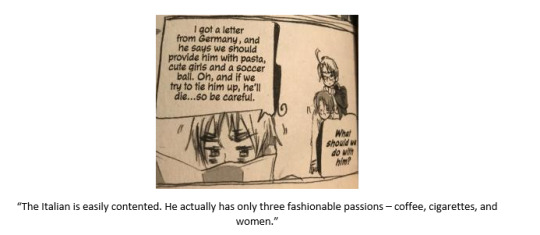
As evidenced by the already described friction, the contempt wasn’t one sided and the Italians were well aware of the hostility and racism towards them. “Count Ciano continually complained in his diary, and popular writers like Aldo Lualdi leave no doubt, that Italy’s German ally was not ‘simpatico’ (‘likable’).” (Of Myths and Men: Rommel and the Italians in North Africa, 1940-1942 )
The racism towards Italians at the time directly relates to the image of them as having been cowardly during the war. German commanders were prone to blaming Italians for whatever failures they endured, whether giving them the blame was warranted or not. Erwin Rommel, also known as the “Desert Fox”, was one notable commander who made a habit out of this. “Rommel increasingly blamed the Italians for his woes, and his disdain reflected the attitude of the German high command. Easily caricatured, Italian soldiers in fact showed flashes of ferocity and tactical competence in North Africa, particularly in infantry skirmishes.” (An Army at Dawn: The War in North Africa, 1942-1943).
Alongside bigotry and finger pointing occurring on the Axis side, both Allied (most notably British) and German propaganda overstated German competence. “The tendency to attribute Axis successes to the Germans and failures to the Italians seems to have its roots in the conviction that Rommel was a genius who could do no wrong, and the belief that Italians were subject to excessive Latin nervousness and made pitiful soldiers. It is thus normal to dismiss as loss of nerve Graziani’s request for permission to retreat in late 1940, even though a retreat seems to have been what was needed. At the same time, Anglo-American writers tend to depict Rommel’s various retreats as evidence of military genius.” (Understanding Defeat: Reappraising Italy’s Role in World War II)
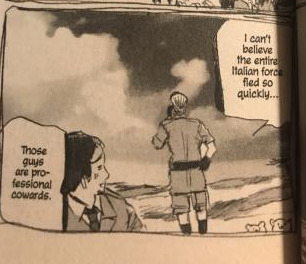
These interpretations benefited both sides propaganda wise. “Perhaps Faldella was correct to see the myth of Rommel as necessary to allow the English to rationalize their defeats as due to the presence of a genial enemy commander rather than to the valor of German and Italian troops. And the Rommel myth also serves the Germans, who can blame the Italians for their own errors and pusillanimity, even though German commanders such as Paulus and Kesselring found Rommel less than an ideal army commander.” (Understanding Defeat: Reappraising Italy’s Role in World War II).
"We have a very daring and skillful opponent against us, and, may I say across the havoc of war, a great general."
- Winston Churchill on Erwin Rommel
With all that said, this section would be incomplete without talking about the Cold War and how the image of the German military, particularly figures like Rommel, as brilliant and super competent, especially compared to their Italian ally, has been prevalent for so long. After the end of WWII and around the beginning of the Cold War, West Germany was seen as a desirable ally against the Soviet Union (having already fought against them) and the conditions for that to happen involved the rehabilitation of the image of the German military, giving German senior military officials more control over the narrative concerning the events that took place during the war. This also led to the myth of the clean Wehrmacht, the idea that the German military had no culpability in the war crimes that had occurred. Bringing back Kesselring and the massacre he had a role in which resulted in a trial held against him by the British, he was one such war criminal who had his image rehabilitated and there was public sympathy for him, including from Winston Churchill. After initially receiving the death penalty and then having that punishment reduced to life imprisonment, he was released in 1952 despite protests in Italy. Another convicted commander, Max Simon, would have a similar fate to Kesselring in that he was released despite his role in the Marzabotto massacre which took the lives of at least 770 Italians.
Summarizing everything up, the Italians were not prepared for a major war and it was known at the time they wouldn’t have been ready until at least 1943. Despite that, what seemed to be the increasing chance of a Germany victory upon the defeat of France led to Italy entering the war in order to not be left in the dust of potential German hegemony. Alongside being not prepared and being on the receiving end of bigotry, the reputation surrounding Italy’s performance in the war was further damaged by propaganda occurring on both sides that exaggerated German competence and the Cold War making it beneficial for British and Americans to allow biased (often including racially biased) German senior officials to have a major role in defining the narrative concerning what happened during the war.

Italy in Hetalia
Italy’s personification gives the racial biases and misinterpretations against Italians a face and then puts him next to the super competent Germany. Germany is focused and serious. Italy is easily distracted. Germany is tough and brave. Italy couldn’t even endure a cat licking him. Italy is cowardly and incapable of keeping secret information a secret when pressured. Germany is strong-willed and will keep important information a secret no matter what he’s put through. Germany can also tie his shoes. Italy can’t.
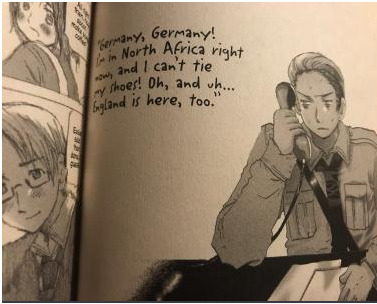
Germany is reliable. The name of the series is literally “Useless Italy”.
Putting aside their individual characteristics, as mentioned above, Germany and Italy’s very romanticized relationship within Hetalia isn’t exactly accurate to what took place between the two countries in real life. In Hetalia, the two share a genuine and very close friendship. There’s even Buon San Valentino which showed Germany being willing to enter a romantic relationship with Italy when he misunderstood some friendly gestures on Italy’s part.
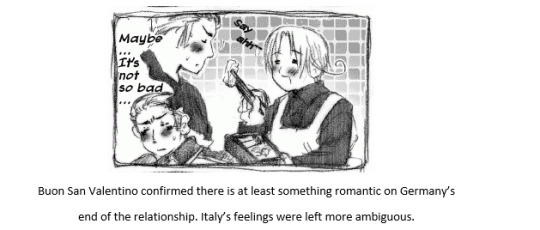
Mixed in with those feelings, Germany takes on an almost paternal role towards Italy which further places emphasis on the difference in competence between the two. This goes as far as having Germany having specific instructions for how Italy should be taken care of which he gives to the Allies when they capture Italy. In return, Italy admires Germany, not just for his clear competence, but for his ability to do even things as basic as tie his own shoes.
Here’s where Romano comes in because he is a completely different story when it comes to his relationship with Germany. He hates Germany and he made that clear from the moment they met. However, Romano disliking Germany doesn’t suddenly make Italy’s fondness of Germany make any more sense given the history (especially since Italy represents the half that was occupied where events like the Marzabotto massacre took place).
Conclusion
When consuming media such as Hetalia where the characters are meant to have some relation to real life events, it’s important to understand what you are consuming might not actually reflect reality. What I’ve covered here isn’t the only case of Hetalia not being accurate. But Italy and his characterization as useless in the given historical context (Word War II) was at one point a major feature of the series. Italy was the face of Hetalia and his relationship with Germany was also a significant part of the series. Those facts are what make this specific case of inaccuracy something worth talking about. There is an addition I need to make before closing this out. A lot of this post covers historical information that can almost make fascist Italy seem like another victim of Nazi Germany above all else. And clearly, there were some ways in which Italy was victimized, But Mussolini and other fascists leaders had imperialist ambitions which was motivation for Italy’s involvement in the war. With those ambitions and Italy’s involvement in not only World War II, but the wars preceding it, (the sames ones that were partly why Italy wasn’t prepared for a major war) came war crimes in the countries that were invaded. Just like how it’s untrue that the average Italian was a coward and subject to “Latin nervousness”, it’s also untrue that Italy was harmless.
62 notes
·
View notes
Text
Having a ball at the Court of Nobility - if you can afford it and make the grade
Practically every country or state in Europe has recognised some form of nobility since the Middle Ages. Those whose privileges were protected by law and where the possession of land was a characteristic mark and aspiration of these elites.
The Middle Ages was defined by a Feudal system in much of Europe typically consisting of kings, lords, knights, vassals, and peasants. The people who were part of the church played an important part too. So when a person was born into a certain section of society, they rarely moved to another level.
It was from European feudal system that nobility arose, where knights or nobles were mounted warriors who swore allegiance to their sovereign and promised to fight for him in exchange for an allocation of land - and these usually came with serfs in situ.
The use of the two terms nobleman and gentleman indicates the difficulty of definition. The terms were loosely used to mark the essential distinction between members of an upper class and the rest. In France, above knights and esquires without distinctive title, ranged barons, viscounts, counts, and marquises, until the summit was reached with dukes and princes of the blood. In Britain, by contrast, only peers of the realm, whether entitled duke, marquess, earl, or baron, had corporate status: numbering under 200, they enjoyed few special privileges beyond membership of the House of Lords.
Landowners
The gentry, however, with assured social position, knighthoods, armorial bearings, and estates, were the equivalent of Continental nobles. With the nobility, they owned more than three-quarters of the land. In contrast, in France, by 1789 the nobility owned barely a third. In northern and eastern Europe, where the social structure was generally simpler than in the West, nobles - dvoriane in Russia, szlachta in Poland and Hungary - were numerous. In these countries, many of those technically noble were in reality of little importance.
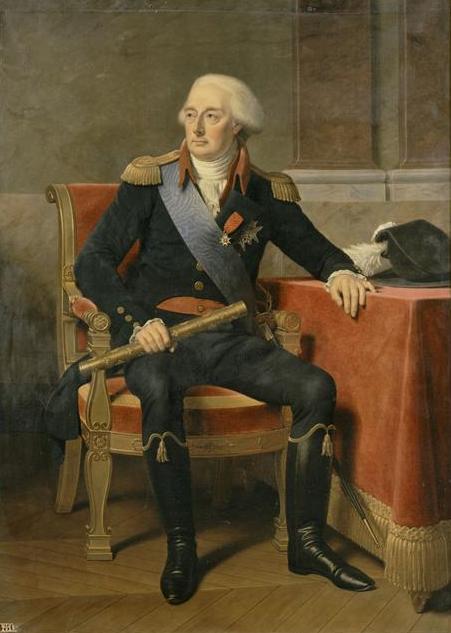
The fine figure of Louis Joseph de Bourbon, Prince de Condé, who was the main founder of the Order of International Court of Nobility in 1793.
You may think all of this as being of little relevance to Western society today - but you’d be wrong. There’s been a growing demand in recent years by what might be termed neo-feudalists - everyday folk like you and me who want to buy - should they have the spare cash - Titles of nobility which have for the most part been defunct and gathering dust for many a year but are nevertheless very real. There are also plenty of fakes around so if you’re in the market for being Lord and Lady of the Manor of Chislehurst-on-Sea, do be careful. Go to every length to check out that the title is genuine article. They make excellent birthday and anniversary gifts for the proverbial ‘person that has everything’ but of course having a title has a prestige value of its own. After all, people open doors for you and turn their heads when you’re announced as Lord and Lady.
One step further and you could become really one of the elite - membership of the International Court of Nobility. It has a heritage of its own, being founded almost 230 years ago by a French noble. Now, you could protest that only Titles granted by monarchs are true nobility, but the order of International Court of Nobility accepts feudal Titles as the said holders of feudal Titles - always regarded as the Nobility Class. As the literal interpretation of feudalism means ‘once based on land ownership’ it could easily be argued that to rule an area of land is to be classed higher that the inhabitants or commoners, therefore, regarded as ruling class - the very definition of nobility. The Order therefore accepts Titles granted by Rulers, Feudal Titles, Military Titles, ancient Titles and Holy Roman Empire Titles.

Limit on Titles awarded
The Order of International Court of Nobility limits 370 awarded Titles to members every year and as these by tradition are a male preserve, a “spouse” receives a complimentary Title automatically. Up for grabs are Lord and Lady, Baron and Baroness, Count and Countess, Marquis and Marchioness, Duke and Duchess and even Prince and Princess (just five annually).
So if you get through the membership qualification in the first place, there are still terms and conditions of these awarded Titles. Recipients have to accept and understand that Titles granted through ‘Letters Patent’ of the Order are subject to the judgment and opinion of the members of an adjudication council, their decision being accepted as final. The Titles are petitioned for and only one petition can be made per year, per title. You’ll also have to hit your wallet again for the correct regalia as it applies to your Title, because you won’t receive your award without it. Like a strict dress code.

Members may be awarded a medal for their achievements in one of eight categories, namely Honourable Deeds, Charity, Local Community Support, Politics, Industry, Sport and Humanitarianism.
While the International Court of Nobility makes no charge for awarded Titles it is expected that recipients remain members of the Order. If the recipient’s intention is to become a member just to get a Title, or drops out before five years pass, his Title will be deemed void and extinct. The whole concept and modus operandi of the Order is the preservation of the Nobility class through membership.
There is some secretiveness about the whole business, perhaps not surprisingly, given that this is an elite collective. Each year in early summer the Court of Nobility holds a membership ball where full regalia is on display along with some distinct ‘bought and paid for’ egos. The ball is held ‘somewhere in Europe’ amid tight security, the country, city and venue made known to members only days before the event.
So, can you see yourself having a ball among Europe’s neo-nobles? You can read more on the International Court of Nobility website www.courtofnobility.org
#nobility#royals#title#french revolution#secret organisation#lord and lady#being the elite#lord of the manor#having a ball
2 notes
·
View notes
Text
‘Supernatural’ season 15, episode 15 screener secrets: We’re ‘Highway to Heaven’-ing this bitch
[everything is from this Hypable article]
This week on Supernatural, Amara returns and are angels solving people crimes now? Hypable previewed Supernatural season 15, episode 15 “Gimme Shelter,” so read on to find out more.
After a sweet and fun return to ease us back into the world of Supernatural last week, things are heating up pretty dramatically – I knew there wouldn’t be much more time for messing around.
“Gimme Shelter” sees Supernatural dip its feet into what the Winchesters currently believe is their big plan – eliminating Chuck by also taking down Amara, resulting in what they believe will be a cosmic-being-free balanced world. But first, they have to find her. Sam and Dean get a pretty good lead on her location, which results in a very interesting conversation between Amara and the boys – especially with her most favoritest Dean, of course.
Meanwhile, Castiel is persuaded into taking Jack to investigate a nearby case in Missouri – which all three adults suspect is probably the work of a human criminal – for the sake of humoring Jack and keeping him both busy and supervised. On the way home, they have a very interesting conversation of their own.
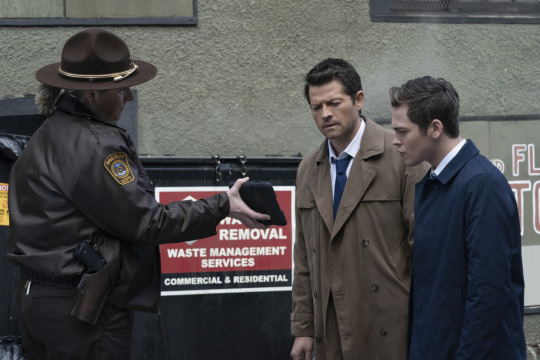
Spoiler Warning: This article contains generalized spoilers for Supernatural season 15 episode 15, “Gimme Shelter.” If you do not wish to be spoiled at all, do not read this article in advance of the airdate.
The official synopsis for Supernatural season 15, episode 15 reads:
MATT COHEN DIRECTS — Castiel (Misha Collins) and Jack (Alexander Calvert) work a case involving members of a local church. Meanwhile, Sam (Jared Padalecki) and Dean (Jensen Ackles) go off in search of Amara (guest star Emily Swallow). Matt Cohen directed the episode written by Davy Perez (#1515). Original airdate 10/15/2020.
If you want to know what to expect from this week’s Supernatural, here’s 10 teasers plus 15 single word clues from our advance viewing of Supernatural season 15, episode 15 “Gimme Shelter.”
‘Supernatural’ season 15, [10] episode 15 screener secrets
1️⃣ During the filming of this episode (27 January – 5 February) Jared Padalecki and Jensen Ackles both spent much of the week at home with their families in Austin, a detail which was made clear on their and their wives’ public social media accounts – possibly the result of scheduled time off as they’ve mentioned occasionally requesting? The result is that the episode is weighted much more towards Cas, Jack and the murder investigation they’re chasing than towards Sam and Dean, but on the flip side, the Sam and Dean arc is more crucial to the long game of the show, so what it lacks in minutes, it makes up for in impact.
2️⃣ However, the episode still begins and ends in a grounded family group way, at home in the Bunker – one of those “we know we should be doing this together but there are Reasons we have to split up” situations. This detail, in my opinion, really speaks to the motivation of the creative team towards honoring the four leads as parts of a whole – in earlier days, this kind of episode would have been two entirely non-touching threads. This one is, if not a tapestry, at very least a braid – tied up together at both ends, and intertwined in the middle.
3️⃣ You might have seen pictures or ominous trailer footage of Castiel and Jack digging a hole at the crossroads. We all know what that means! However, don’t worry. They simply want to talk – and the demon they summon has some really interesting – and dare I say positive? – news about the state of Hell under Her Most Gracious Majesty Queen Rowena. Let’s just say the demon is actually pretty friendly… and extremely bored.
4️⃣ The two main guest stars on Cas and Jack’s side of the episode are both actors who have been briefly featured on the show before, in a couple of pretty famous episodes – one from season 2 and one from season 5. I don’t think there’s meant to be any meta or Easter Egg element to this, just the usual Vancouver casting industry cycle (see the ‘Weren’t You In Another Episode‘ reference page on the SuperWiki) but one of them is one of those cute “I appeared on Supernatural as a child and now I’m here as an adult” situations, and the other, well… the original character’s very name has become the stuff of Supernatural legend, and if I were in charge of this episode I would have put the actor in a particular piece of footwear and made sure we got a shot of it, just for kicks.
5️⃣ Castiel steps into a prayer circle when the church group members are meant to give a testimony – presumably of their journey so far and their relationship with faith. That’s what Cas chooses to share, at least – in a non-specific, humanized way – and fans of the character will be moved to hear the ways he verbalizes his own growth.
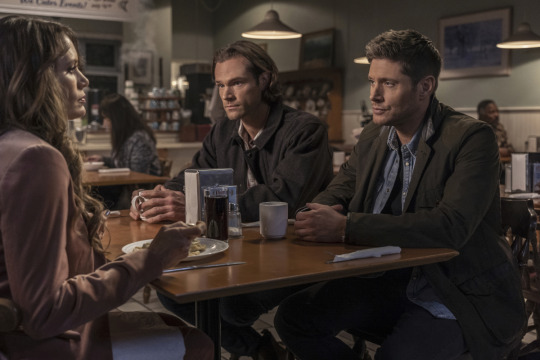
6️⃣ Speaking of growth, some of Dean’s is spelled out for him in the most miraculous way by Amara. After Sam and Dean meet up with her and have a conversation about Chuck that’s ultimately a bit of a non-starter, Dean returns to ask her another, more personal question. Her response gave me legitimate chills. It’s a very weighty mic drop and the combination of the level of impact and the level of clarity (it’s entirely airtight, no room for interpretation) feels like the culmination of all the self-actualization work the show has been doing on Dean in the last four years. (I wish I could tell you Sam got a big special moment like this in the episode, but he doesn’t. Amara’s return was always going to be Dean’s thing.) Amara’s speech to Dean… it doesn’t feel isolated, like the idea of it was invented just for this episode. It feels more like concrete evidence of what the show has been trying to prove for ages. And the funny thing is, Amara is the anti-Chuck, right, and all season, we’ve learned about the version of the story Chuck thinks is good, and we’ve been told to root against that. Chuck’s version of Supernatural isn’t how the writers really feel. But I think Amara’s might be. Dean has obviously struggled to see what she tells him, all in one piece, but here it is – this was the point, laid out on the table, from the entity behind the curtain – both onscreen and off. Amara knew what she was doing, and so did the writers. This was always, always the point.
7️⃣ Even before this massive scene, Amara’s return is just great. Emily Swallow does such an incredible job with this character – she really is the anti-Chuck even without the whole writer comparison. Swallow imbues this character with such an incredible peace and stillness in comparison to Chuck’s histrionics – this was true in the way she spoke and behaved even in season 11, but this Amara also feels kindness and patience and tolerance. She radiates power, even when she’s also slightly goofy. There’s no fight, there’s no antagonism, but the boys in her presence are like little fish in a vast ocean – they quickly realise they have no real control in this conversation. The way that we leave her indicates she’ll be back and has more to say or do, and what she shared during her reunion with Sam and Dean makes me really curious about the role she’s due to play in the show’s endgame.
8️⃣ I’m not very religious but I really like the version of a church group or ‘faith-based community,’ as they say, featured in “Gimme Shelter.” Supernatural has a shaky history in terms of how the show portrays people in-universe who believe. Sometimes they’re treated like a joke, or stupid, or dangerous, or hypocrites, but occasionally civilian acts of faith are shown as great and powerful things, even in a world where we know that what they believe in isn’t strictly accurate. That concept became an even bigger question mark for me when we got the reveal that Judeo-Christian God is not only absent, but our actual villain. However, this was a really nice look at why faith can still be a framework for a good way of life – loving thy neighbor – for some people, no matter the truth about Chuck. The episode also features a callback to writer Davy Perez’ very first Supernatural episode “American Nightmare” in terms of the way that some people have weaponized faith and religion to the detriment and harm of others or even themselves, but this factor does not negate the positive point mentioned above.
9️⃣ Supernatural alum and newly minted director Matt Cohen really got the full old-school Supernatural episode experience when it comes to leaning into the spooky horror element. The murderous case-of-the week featured in this episode is heavy and lingering on the gore and even contains a little bit of a jump scare, so view responsibly.
🔟 So, um, you know that line, in this week’s teaser trailer? The line that a lot of people are freaking out about because it seems to pertain to something important that we know about Cas’ fate that Dean and Sam aren’t aware of? Yeah, it is 100% absolutely not about that at all. It is about something super important, but it’s not that. It’s also the last line of the episode, but trust me – it’s not a cliffhanger and it’s not a red herring and it’s not a twist. The information is gleaned within the episode and you’ll know exactly what Cas is telling Dean about after seeing it – narratively, that’s the reason it isn’t in the episode, because the show clearly assumes you’ll get the picture and can skip a rehash of information. But what you were probably expecting – maybe even hoping for – it’s not that. You’re gonna have to hang on for that one.
Finally, have 15 random yet significant words from this week’s episode without any context whatsoever: Gaia, Ronald, mother, pierogies, cats, philosophy, target, blind, permission, lockdown, Kool-aid, buffet, gift, trial, choice.
‘Supernatural’ airs Thursday at 8/7c on The CW
#spn s15#teasers#spn 15x15#Hypable#preview#thoughts#s15#15x15#this gets long as well as spoilery hence the /under the cut/#destiel
12 notes
·
View notes
Note
Hello, hope you’re having a good day. I was wondering for you lovely expertise. I’d like to write more of ladies in my little book, since it’s highly undervalued in books, and want each regions to have their own distinctive style. Also all the gossip happens whilst they’re embroidering. It’s historical based and but it’s quite a mesh of different cultures at different times yet the foods pretty European mediveal and south Asian based it’s not nearly sexist. Have you got any style ideas or types?
I’ll presume you mean it’s a non-Earth setting that’s pre-industrial medieval in its tech level, with influences from South Asia and Europe.
If it’s pre-industrial, then they won’t have instantaneous communication with far-flung places...but you can still have them living within, say, walking distance of each other. How? Well, if it involves a whole bunch of different styles and regions and foods, etc, you will want some sort of crossroads city for your characters to live in. Examples of highly multicultural cities include Rome, Constantinople, Mumbai, Hangzhou, places like that.
Port cities are great for this because sailing can be faster than land-based travel (boats with sails don’t get tired so long as the wind keeps blowing more or less steadily), but land-locked crossroads are doable, too--cities along the Silk Road, for instance, would see a flux of travelers seasonally, and some would bring their families, or fall in love, settle down, and stay. You definitely will want to consider a couple of things though, and trade with other regions is merely the first of them.
European medieval...well, everything...was influenced by its climate. The foods that could be grown, the architecture needed to survive the hotter Mediterranean areas or the very cold taiga (subarctic forests) of Scandinavia, and everything in between. They developed many methods of preserving foods to keep it from going rotten, but a lot of it relied on smoking, drying, salting, and even freezing (icehouses were a thing in some regions even before it became industrialized). Clothing styles are definitely designed more for surviving the cold and staying warm than in keeping cool, and to keep their clothing warm even when wet (yay wool).
South India (except in the more mountainous areas) tend to be very hot and vacillates between hot and dry and very very wet (yay monsoon season). Food preservation did include salting, dehydrating, smoking, but very little freezing, and the flavoring profiles were completely different, as (unlike herbs) a lot of spice plants actually require a hot climate to grow. (People trying to grow peppers in Alaska are still having a hard time despite decades of careful cultivation, breeding, and selecting for cold-weather hardiness.) South Asian clothing styles are designed to keep the wearer cool and comfortable, and to dry quickly when it rains (yay sari fashion, the one garment that has been in continuous use / popularity for over 5,000 years).
So you’re going to have to decide what kind of region this city is located in, and what kind of weather and/or seasons it experiences. From there, you can figure out what kinds of architecture they’ll have, the size of the windows, whether they’re covered all year round (glass, oiled parchment, sheets of horn, etc), or only partial, or narrow pierced openings to keep the air flowing while keeping out hot sunlight, etc.
From that, you can also interpret what kinds of clothing people will be wearing. If cultural identity is strong, some groups will cling more to their saris and chamsas, while others will wear their hose and their houppelandes, or their Norse apron dresses, their great kilts, whatever. (Archer hoodies, aka mantles, will be popular across a wide range of eras; they’re great for keeping head, shoulders, and a bit of the chest dry in the rain, and you can turn them into those fancy cockscomb hats if you know how--ask me if interested!)
Once you have climate, architecture, clothing established, figure out which foods will be locally available, which will be imported, from how far away, and whether or not any special equipment is needed for growing said food--if glass is a locally produced commodity, with sand reserves and limestone for flux (lowering the temperature) and plenty of wood or coal for burning in the furnaces, it is possible that a colder climate has glazed greenhouses in which to grow the plants that need hot conditions to produce spices, for example. Or it’s just that all the colder climate foods are grown on the north-facing slopes of nearby hills, and there are irrigation canals everywhere to keep everything watered.
(If it’s a world with magic, do consider the ecology of how the magic is generated, used, spent, where it goes when it’s used up, how difficult it is to use, what system is required to access it (inner energies of a mage, special runes or material components, the blessing of a deity or patron entity, etc).)
If it’s not going to be nearly as sexist (thank youuuu!! *gives you a basket of hugs, prepackaged in biodegradable shrinkwrapped, magically enchanted in stasis so they’re a fresh-from-the-dryer snuggly warm blanket kind of hug*), then you’ll want to decide what legal protections females (and/or any nonbinary folks) have. What positions they can hold, how much of their personal belongings and/or income they can retain or control, what they’re legally allowed to inherit, and what say they have in who they marry or what job they take up, what apprenticeships they can hold, etc.
You don’t have to shove it in people’s faces, but you can definitely weave it throughout the story--Guildmistresses of various craft positions, noblewomen in leadership roles, royalty inherits based either on the firstborn, period, or on whoever is deemed the most competent--this can be an interesting plot point for a disaffected male “heir” who was set aside in favor of his more competent sister, etc--and in other ways. You can also have women warriors being taken seriously, whether they’re town guards or kingdom soldiers, and women sailors being treated as equal to the men, without the superstition of “a woman on a ship will curse it!!!1!” which was the medieval version of “ewww, girl cooties!” I guess... (idek *eyerolls at medieval/age of exploration men*)
Your plot will also have a lot to tell you about the world these people live in. If they’re embroiderers who gossip a lot, are they living in a town where their embroidery is sought out by merchants from near and far? How valued by their society is it? Are they plotting while embroidering to change certain laws, social situations, etc, because “nobody would suspect embroiderers of favoring the disposed Crown Prince over his sister, since surely the sister will buy all their wares? (except she doesn’t; the crown princess expects them to provide it for free, how dare!!)”
I have no idea what your plot might be, but it can give you directions and ideas if you think about it. The most important thing to remember in all of this is that all these things interweave together. Sometimes this will cause problems (side plots!--zomg we’re all out of purple thread and the crown princess will kill us for not having any purple dye!!) and sometimes this will create solutions (sending secret messages to the prince’s supporters via embroidery!!), etc, etc.
Hope that helps at least somewhat!
#RewritingForFeminism
#MultipleCulturesInOnePlace
#answers
1 note
·
View note
Text
[FIC] Luffa: The Legendary Super Saiyan (132/?)
Disclaimer: This story features characters and concepts based on Dragon Ball, which is a trademark of Bird Studio/Shueisha and Toei Animation. This is an unauthorized work, and no profit is being made on this work by me. This story is copyright of me. Download if you like, but please don’t archive it without my permission. Don’t be shy.
Continuity Note: About 1000 years before the events of Dragon Ball Z.
[October 25, 233 Before Age. Despye.]
"The shipyard has a few surface-to-orbit cannons. Here, here... and here."
From inside his cell, Guwar pointed at various spots on a map printed from his ship's database. It had always been his plan to share this information with Luffa once he reached Federation space. He hadn't really considered how that handover would work. In hindsight, he supposed that it had been naive to think that he would just tell Luffa what she needed to know and that would be that. They didn't trust him, not completely. And so he was confined to a holding cell while a blue-skinned alien interrogated him over and over.
"Good," she said as she scribbled notes onto a pad. "What sort of ships do they have in the yard?"
He sighed before answering. "Mainly surplus Camelian cruisers, a few privately owned mercenary craft, all stolen, of course. There's some freighters for covert ops and troop transports, but most of those were already deployed. Our warriors would take them to various star systems and then hijack other ships, then take those into Federation space. That's how we managed to avoid being traced back. But you already knew that from the last four times I answered this question."
"Just seeing if you can keep your story straight, Guwar," she said. He didn't know her name, or even what planet she came from. He didn't think she was very strong-- not by Saiyan standards, anyway. But then, he wasn't very strong himself anymore.
"Tell me about the Jindan formula," she said. For a moment he thought she might have read his mind, but he knew this was impossible. It probably wasn't a coincidence either. She kept asking about the same things over and over, expecting to catch him in some lie.
"Trismegistus created it," he groaned as he explained it again. "The rest of the galaxy knows him as the Saiyan King Rehval, but you have to get to a certain rank in the cult before he reveals that to you. Some Saiyans can't handle the truth, so he wipes their memory and makes them repeat the indoctrination until they can accept it."
"Not what I asked," she said.
"I'm just trying to keep this interesting," he said. He got up from his seat in the cell and paced around a bit before sitting back down. Her chair didn't look that much more comfortable than his, but hers had a thin layer of cushioning that he envied.
The alien put her pen to her lower lip. "Oh, it's already pretty interesting, Guwar. Keep talking."
"The Jindan potion makes Saiyans stronger. Something about tapping into a wellspring of energy from the earth, and using it to supplement the life energy in the body. Rehval makes this potion and you drink it." As he mimicked the act of putting a goblet to his lips, he paused as he recalled the rush of ecstasy he felt as he received the power. In that moment, he had felt like he could do anything. It seemed like a hundred years ago.
"Is that how you get the Mindworm?" she asked.
"No, that's a different procedure," he said as he tapped the side of his head. "Your mistress already knows about the Mindworm."
"Mistress?"
"Well, you work for her, don't you? Like, her butler or something."
She laughed quietly and jotted something down in her notes. "Butler, right. Okay."
He shrugged and decided there was no point in prying. "The Mindworm attacks anyone who tries to probe our minds. It protects his secrets. And it's permanent. The Jindan Power, he can take that away whenever he wants. He withdrew it from me while I was on my way here. The catch is, he takes some of my own power with it. Like he's collecting interest."
"So you end up weaker than you were before you started," she said. "I thought I sensed something weird about your ki."
"You can sense my ki?" he asked. He suddenly felt very exposed. Her left eye, the one that wasn't covered by the patch, seemed much more intrusive as she stared into his cell.
"Oh, I can sense more than that, Guwar," she said. "Ki, temperature, heart rate. Why do you think I'm doing this interrogation instead of her? I mean, she's got better things to do, but besides that."
"You're what, then? Some sort of lie detector?"
"Not exactly," she said. "Let's just say I've learned how to interpret a Saiyan's pulse. But enough about me. Tell me about the Nagaoka system again. You said Rehval's on the second of four planets, right?"
"No, I said there was only one planet. Nice try."
She smiled and glanced down at her notes.
"This is a waste of time!" he said. "I already told you everything you needed to know. I thought Luffa would be halfway to Nagaoka now. The longer she waits--"
"You let us worry about that, Guwar," she said. "All you have to do is answer my questions."
"Can I ask you something?"
"Sure, but I probably won't answer."
"Can Luffa defeat him? I mean, she's the Super Saiyan, but is that enough?"
The alien looked up at him with a serious expression. "She's more than enough, Guwar. But you already knew that, didn't you? Otherwise, why else would you risk everything to come here?"
"I... I'm just hedging my bets," he said. "The universe has gotten too hot for Saiyans lately. It's all coming down between Luffa and Rehval, and anyone who doesn't pick a side will get caught in the middle. Rehval's insane, so there's only one other choice."
"You're lying," she said. "If all you cared about was saving your own skin, you'd have taken your ship as far away from here as you could go. Rehval's got you worried. Not just about yourself, but for everyone."
"You can tell all that from my body heat?" Guwar scoffed.
"No, I can tell from your answers," she said. "You're in a big hurry for us to stop this guy, even though he's already punished you for turning against him. And you keep talking about how all the Saiyans will be doomed unless she saves them. You've seen the light, Guwar. Just like I have."
There was nothing he could say about that. He wanted to tell her she was wrong, or that he didn't believe her, but the truth was that he wanted her to be right, at least as far as Luffa being able to win. So instead of saying anything, he just turned and faced away from her, but only for as long as it took for him to pace the length of his cell. She was still there when he turned around.
"Let's move on to those spears you guys always use," she said. "What's the deal with those?"
*******
While Zatte questioned Guwar on Luffa's ship, Luffa herself was briefing the Federation Council, along with its top military commanders, on their planned counterattack. Despye prided itself on the image of a pastorial, agrarian society, but it was also home to a powerful military-industrial complex. Prester Ganzut wore a simple pair of pink overalls and often carried a ceremonial pitchfork when conducting political business. He even smelled of hay, suggesting that he had always just stepped in from tending his fields, though Luffa suspected that he used some sort of farm-scented cologne. The more she got to know the man, the less and less he seemed like a simple man of the land. Watching him host the Federation's leaders in a heavily armored amphitheater only made it that much clearer to which world he belonged.
"Federation observatories have confirmed the presence of a star system in the coordinates you gave us," Marshall Booth said as he addressed the delegates. Luffa didn't care much for him either, but at least his red military uniform told no lies about his agenda. "We don't want to send scout ships, since it might tip our hand, but we've managed to verify just about everything else that Guwar has told us so far. He even told us about an upcoming raid, and gave us the codes to disable their ships. We defeated them easily."
"It's a little too good to be true, isn't it?" asked Emir Plair of Porpozit. He was an ophidian being with thin legs and arms, and a forked tongue that darted out of his mouth every so often. "We've been fighting these cultists for months, with no end in sight, and suddenly this defector shows up on our doorstep and tells us everything we need to win?"
"Attacking Nagaoka won't be a walk in the park, Emir," Luffa said. She uncrossed her legs and leaned forward in her chair. "I intend to personally kill every Saiyan on its surface, but we'll need a whole fleet to surround the planet so no one escapes. And we'll need a second fleet to guard the first one from any counterattack. Rehval won't go down without a fight, and Guwar tells me that his Jindan powers are strongest there."
"We ought to contact him first, shouldn't we?" asked Jett Farthing, Leader-1 of Kiqs IV. He looked like a pile of tentacles stuffed into a blue robe. "Once he finds out that we know where his lair is, he might be open to negotiations."
"He's not interested in negotiations," Luffa snarled. "I tried playing nice with him before, and he lured me into a deathtrap. Drang Dedruhn still hasn't recovered from that charmed necklace he gave her. I won't underestimate him again. Besides, why would any of you want to talk peace with that bastard, after everything he's done to your people?"
"Yes, the element of surprise is vital to this offensive," Booth added. "Even if the cult knows that we have Guwar, they won't know when we'll strike, or how our attack will be carried out. We may not get a second chance at this."
"Rehval seems to take that planet pretty seriously, but he'll abandon it if he thinks he's cornered," Luffa said. "Don't forget about those rock-creatures he's been manifesting on your planets. If he can control those things from another star system, then he probably has some way to escape Nagaoka in an emergency." She punched her open palm as she spoke. "That's why we've got to hit him hard and fast, and from all sides. If we catch him off-guard, we can disrupt his contingency plans before he has a chance to use them."
"Seems t'me that's exactly what he'd want you to try, darlin'," said Prester Ganzut. "You take a fleet all the way out to Nagaoka, and leave our homestead vulnerable to his next attack. If I were him, I'd already be on my way here, leading my own fleet into battle while yours heads to an empty planet."
"We thought of that," Luffa said through clenched teeth. Her tail moved in such a way that would have made her growing irritation very obvious to anyone who understood Saiyan body language. But to the aliens delegates of the council, she simply appeared to be slightly anxious to get underway. "The entire Saiyan Free Company will be going with me to Nagaoka, along with the third and sixth fleet from the Federation Navy. Booth will be taking the ninth fleet to the Gelbo System, about halfway between Nagaoka and here. The rest of our forces will remain in Federation space to deal with any new invaders. From Gelbo, Booth can coordinate with both fronts, and deploy reinforcements wherever they're needed."
"Will the remaining fleets be enough to protect us?" asked Saith Reinar of Rastraw II. Her exoskeleton clicked and the gold bangles on her six limbs clinked as she trembled with anxiety. "We've all seen what those Saiyans can do once they reach the surface of an inhabited world--!"
"Which is precisely why we must intercept and destroy incoming ships before that happens," Booth said. "I have already issued new shelter orders for civilian populations, and local defense forces have been mobilized for--"
"None of that will mean anything if a band of these Saiyan fanatics get past your fleet!" said of Bort Samsa of Drakkenfilt. His body was covered in a thick layer of symbiotic moss, which made his form difficult to make out. "They've managed to do it time and time again during this war, even with all of our forces on the defensive! And now you want to send troops to Gelbo!?"
Booth didn't have a tail, although Luffa could imagine what it might have looked like if he had one. "We have to take the offensive," he insisted. "If we adopt a siege mentality, then the enemy will simply wear us down."
"Hold on a moment," said of Chet Vil, President of Boiperpei. He spoke slowly, more deliberately than the others. While they seemed more terrified of the risks, he talked as though giving a speech to his caninoid constituents back home. "In these unprecedented times, it's clear that there's a great deal at stake. And I think that what we should be focusing on is finding a way to attack the enemy and defend our territory at the same time, without dividing our brave fighting forces. It could be very beneficial to the Federation. Why, just think of what we might accomplish, not only in this war, but in future conflicts."
"You're an idiot," Luffa said. "I only came here to brief you all on my plans, so that you could prepare your people for what might happen if anything goes wrong. I'm not interested in suggestions, especially nonsense. You're up, Dotz."
Nearby, Dotz rose from her chair and gingerly waved to the councilors, then clasped her hands together for a moment, before fidgeting with the purple shawl that hung around her neck and shoulders.
"We've been briefed about your psychic, Madam Federatrix," said Tak-Tik of Kopey. "And we know that her predictions are no guarantee of success."
"Dotz can see the future a lot more clearly than anyone else in this room," Luffa said with a smile. "And she's accurately predicted every Jindan attack inside of Federation space. The only reason we've taken as many losses as we have is because we couldn't always keep up with the invasions, but she always knew where they would show up, and when. Tell them what you told me, Dotz."
"W-well," she began. "I've been trying to improve my abilities lately, for the war effort and all. When Luffa told me about this attack on Nagaoka, she asked me to find out if the prisoner she captured was telling the truth about it. I saw a battle taking place there. Very terrible, but I can't tell anything specific about it. So there must be something there worth fighting over."
There was a rumble of murmurs from the council, and Luffa gestured for Dotz to continue.
"As for the Federation, um, well I'm sorry, but I don't really see any fighting inside your territory, not with Saiyan invaders anyway. Other enemies are harder for me to forsee, unless you have one in mind that you want me to look out for."
"I can't be sure of Dotz' maximum limit," Luffa explained, "but she's forecast battles a month before I fought them. The accuracy gets kind of fuzzy further out than that, but it won't take more than two weeks for the fleet to reach Nagaoka. Dotz says the cult won't make a move while we're gone, and that's good enough for me. Even if something did happen, you'll have Booth's group one week away at Gelbo."
"Convenient, ain't it?" asked Prester Ganzut. "That the enemy'd suddenly stop attacking us like that, for no good reason."
Luffa turned to look at him with an eager gleam in her eye. "Oh, I'll give them a reason to stop attacking, Prester," she said. "They won't attack the Federation because they'll all be dead after I finish attacking them. Or maybe they'll win, and you all can negotiate a settlement over my dead body. Either way, the war will be over, which only confirms that Nagaoka is where the last battle will be fought."
"And we should accept this as fact? Based on the words of this... this confidence man?"
Luffa shot a dirty look at a woman who now stood up from the group. "Do you have a problem, General Bailgrad?"
The general made a self-satisfied smirk as she peered over her glasses to look down at Luffa on the floor. "Not with you, Madam Federatrix, but I have a duty to object to the quality of your advisors. It's shameful enough that our entire defense is centered around 'psychic' visions, however accurate they may be."
"Dotz's prophecies are legitimate, General," Luffa growled. "I wouldn't have consulted with her if I didn't believe in her abilities."
"It's not a question of ability," Bailgrad replied. "It's a matter of allegiance, of competency. How can you trust someone who's not even a Federation citizen, who has no stake in this war? Why, just look at him."
"What?!" Luffa snapped.
"Really, Luffa, I'd like to think that women have made some genuine progress in this society. You're a role model, and it's very damaging to your cause when you humor such infantile notions that biology can be circumvented, simply by dressing up like my grandmother. How can we even take seriously a prophet who doesn't know whether he's a--"
As Bailgrad spoke, Luffa stretched out her hand, and quickly twisted her wrist, pointing her index and middle fingers toward the ceiling. As she did, the general suddenly exploded where she stood. Everyone around her cried out in terror, and yet, the force of the blast was directed upward, the energy so carefully controlled, that the people nearest to Bailgrad felt only a stiff breeze. As for the general herself, nothing remained but her shoes, and a plume of smoke that rose up from them.
"I'll only say this once," Luffa said. "Dotz has saved countless lives in this war. She has my complete confidence. If any of you dare to insult her like that again, I will slaughter you without hesitation. Now. Does anyone else have anything to say?"
No one did. And so Luffa adjourned the meeting, and gestured for Dotz to follow her back to her ship.
"Y-you didn't have to do that," Dotz finally said.
Before Luffa could reply, she noticed Prester Ganzut running after them from the corridor.
"Luffa, wait!"
"The meeting is adjourned, Prester," Luffa said coldly.
"Beggin' your pardon," he said, "but you know it ain't that simple. That wasn't some buck private you just destroyed. Bailgrad's got a lot of friends on Despye. Lot of pull in the rest of the Federation too, f'r that matter."
"Hah! Not anymore, she doesn't," Luffa said with a smirk.
"Consarn it, I'm serious, Luffa!" Ganzut said. He wore the pink overalls of a simple Despyan farmer, but he was as much a career politician as the rest of them. His snowy white hair and leathery skin only meant that he had been doing it longer than most. There was a time, not so long ago, when she found him and others like him to be somewhat amusing.
"So am I," Luffa said. "I protect all of you people by choice, and somehow you think I'm just going to sit quietly and lick your boots while you disrespect my comrades? Think again, Prester."
"I know what you're capable of, ma'am," he said. "And personally, I think Bailgrad deserved what she got. Not much of a general if she couldn't see the tactical flaws in pissin' you off."
"She wasn't a general at all," Luffa said. "Just another pencil pusher behind a desk, handed a title she was never qualified to hold. Just like all of those 'friends' on Despye you were warning me about, Prester. Now that I think about it, maybe someone needs to clean things up on this planet of yours."
He chuckled for a moment, and then his eyes went wide as he realized she wasn't joking. For a split second, his arm reached out, as if he meant to grab her by the shoulder. Perhaps this was how he was used to scolding other women of Luffa's size and stature, but he thought better of it, and kept his hands to himself.
"It don't work that way!" he said, almost pleadingly. "Can't you see that? I thought you woulda learned by now how complicated this stuff is. The government only works when it keeps enough of the people in line. Sometimes that means making compromises, darlin'. You scratch someone's back so they'll scratch yours later. You learn to eat slop and like the taste, because not all of us can break a mountain in two, or shoot lasers out of our hands. It's all a popularity contest, and--" he paused to glance at Dotz-- "beggin' your friend's pardon, there's a lot of rotten ideas out there that are a lot more popular than you are."
"Is there a point to all of this, Prester?" Luffa asked.
"Dagnabbit, I'm tryin' to tell you that if you keep throwin' your weight around, there won't be any Federation left to run! You probably don't look at the polls, but folks ain't as keen on you as they used to be. Some of 'em think you're a troublemaker, and there's plenty others who say you started this whole war, just so your Saiyan buddies could take over. Nobody can stop you, but if you push them too far, a bunch of 'em will die trying, and they'll ruin everything else while they're at it. So just... just back off a hair, is all I'm sayin'."
"Is that all? Fine. Here's what I say."
She grabbed Ganzut by the front of his pink overalls, and lifted him off his feet with one hand. Dotz gasped at the sight of this, but knew better than to interfere. To Ganzut's credit, he didn't panic, though it was clear from his expression that he would have much rather stayed on the ground.
"You probably think I don't keep up with current events much," Luffa said as she stared into his eyes. "I'm so busy fighting your wars, or looking for my own battles, so you figure you can do as you please while my back is turned. That's what got Bailgrad killed, Prester. She got so complacent, so used to thinking she was untouchable, that she forgot how to behave when I was right in front of her."
Ganzut tried to talk, but there really wasn't anything he could say at this point, so he ended up just making a series of nonverbal grunts. Luffa smiled.
"The fact is, I have been paying attention to what goes on in the Federation. The deal was that all of you kings and ministers and presidents would work together and keep things running smoothly while I protected you. And you've done a halfway decent job, but there's plenty of corruption and inequality in the system. Humanoids like Dotz don't get the respect they deserve. The outbreak of space cholera on Fedender is being completely mishandled. Some third-rate celebrity has been stirring up a campaign to harass Ichthyoids on Eetie, based on some laughable conspiracy! Oh, and one of your own department heads has been withholding technical services to farmers with malfunctioning equipment. Are you going to tell me to back off from that, Prester?"
"W-we're workin' on that!" Ganzut said.
Luffa dropped him to the floor. "Work harder," she said. "Because when I get back from Nagaoka, I may just decide to take matters into my own hands. And you might not like the way I solve problems. I won't be very popular by the time I get done, but that's never mattered much to me before."
She turned and left with Dotz. Ganzut gathered himself from the floor, coughing and struggling to catch his breath.
*******
"What did he say then?"
"Nothing. What could he say? He probably thought if he argued with me anymore, I'd kill him like I killed Bailgrad."
"Would you?" Zatte asked.
"Nah, he's not such a bad guy," Luffa said. "He's in a difficult position, or at least what he thinks is difficult. I killed Bailgrad because she was an embarrassment. She owed her life to Dotz's predictions. A little courtesy is a small price to pay."
After the conference, Luffa had returned to her ship, which she and Zatte prepared for the long trip to Nagaoka. Together, they took inventory of the supplies in the cargo bay.
"Is that what's next for us?" Zatte asked as she checked the expiration date on a crate of flour. "After we settle things on Nagaoka, I mean. I was starting to think you were planning to leave the Federation for good."
"Oh, I thought about it," Luffa said. "Trouble is, there's nothing else out there for me. I started this alliance to make things simpler for me while I hunted down Kandai. Ever since then it's been more trouble than it's worth, but there's no bigger battles out there for me to find. I might as well stay put and hope the competition comes to me."
"You don't think Nagaoka will be big enough for you?" Zatte asked.
"To tell you the truth, it doesn't matter much anymore. I... maybe this won't make any sense, but I'm sick of this war. When it started, it seemed like a proper challenge, but I've just been fighting variations of the same battle over and over again. The only real issue is keeping my injuries under control, and making sure we get to the next planet in time. It's more about time management than combat. The enemy knows they can't match my power, so they're just trying to wear me down, so what could they hope to do when they're on the defensive?"
"They might have a secret weapon or two," Zatte offered. "Something Guwar doesn't know about."
"Thanks for trying to cheer me up, but I think they would have used something like that by now," Luffa said. "Anyway, it doesn't matter. When this is over, there probably won't be any new fights for a while, and I think I'm okay with that. I think I'd rather wait for something big to show up instead of trying to force it. I just have to keep busy in the meantime."
"So this social justice campaign is your new hobby?"
Luffa lifted a tank of potable water to read the lot number on the bottom. "I'm not looking forward to it, if that's what you mean. I just know there's a lot of people like Ganzut who feel like they're stuck, and to me it doesn't seem all that hard to get them unstuck. There must be something I can do, and I'm not afraid to bust some heads to make it happen."
"Well I think it's perfect," Zatte said. "It might take you a while to get the hang of it, but with your power, there's no limit to the good you might do for people. Not to mention all the other Saiyans."
"What about them?" Luffa asked.
"Well, with Rehval defeated, they'll have to recognize you for what you are, right?"
Luffa put down the tank and shook her head. "You're a dreamer, Zattie. You ought to know by now how stubborn my people are."
"Seltiss is starting to see it," Zatte said. "And Guwar too. They won't admit it, but I can tell. They wanted Rehval or someone like him to prove you wrong, but now that they see him for what he really is..."
"I can see it now," Luffa said. "'And that's the story, children, of how Old Luffa got all the Saiyans to start planting trees and lobby for fairer transportation laws.'"
"Hey, don't sell yourself short," Zatte said. "You can do anything you set your mind to. And don't worry about getting bored. Trouble usually finds you sooner or later."
"Hah! I hadn't thought of it that way," Luffa said. "Maybe it won't be so bad after all."
NEXT: Left Behind
#dragon ball#fanfiction#lssjluffafic#super saiyan#luffa#zatte#prester ganzut#dotz#ryba booth#guwar#general bailgrad#despye
5 notes
·
View notes
Text
I think Ember’s entire self would have fit really well as being a deceased Kpop idol. Not just in terms of who she is as a character and it giving her more depth and personality that already matches her canon, but also give great social commentary on how toxic the music industry, especially Korea's, can be.
More detail explaining this under the cut.
Firstly a disclaimer: I was an absolute Kpop weeb in my high school years. I knew all the bands and dances and stuff, and thus I was somewhat exposed to the culture of Kpop. Since then, I kind of have gone back and done some researched and watched documentaries and the like (because I am a big sociology nerd), but I'm not that deeply invested in Kpop anymore. But this is a thought I've had for a long time, ever since I first began to hear some of the problems surrounding Kpop idols and such.
I also want to point out that I am not saying that Ember within canon is a deceased Kpop star. She clearly isn't, and I'm not trying to make a case as to why she is given canon evidence. I'm writing this because I really like this interpretation a lot better than what canon gave us. In my own personal headcanons and worldbuilding and rewrite fanfiction, Ember is a deceased Kpop star.
We got that squared away? Coolio. Let's start.
Now that “preface” or whatever is out of the way, I really want to begin this by giving some background on Korean pop, specifically the industry and the culture surrounding it, for those who don't know. This is going to give some much needed and important context behind what I'm about to say about Ember. I will also be providing as many sources as I can to this section, but a lot of this is really easy to find on google as well.
In Korea, to be a pop star: you basically have to be perfect. In your dance, music, appearance, your entire image is now basically the property of your manager. Plastic surgery is a massive deal in South Korea, and it's partly due to this.
When you get your contact, you basically have to go through a bootcamp, which involves: Limited contact with family and friends, dropping any romantic relationships or behaviors that would be deemed unwholesome (many companies even go as far as forbidding relationships so that fans can better “see” themselves as being with the idol, which increases sales), brutal training schedules and everything you do is so heavily monitored by your bosses. This has lead to many Kpop idols (especially women) to be dangerously underweight or to have eating disorders, 15 hour training days day after day, being fired for being in a relationship outside of their company's approval/against contract. It's caused literal deaths and mental breakdowns.
Of course, America has the eating disorder problem too, and long work days. But please take in mind: management in Korea actively pushes for these eating disorders and are almost applauded publicly for keeping their stars thin, while in America, it becomes an absolute scandal. And yes, America has long work days too, but in comparison to Korea, American musicians basically only release a single or two in a year, and an album about every three years or so. On average. Kpop groups are pressured to release one or two albums every year on top of regular singles. If you youtube Korean pop shows, there's so many examples of stars collapsing on stage due to exhaustion and hunger. And most of the time, they're forced to get back up and continue, compared to America where they're normally “hey show over”. There are some Americans who will go through with it, but it's normally stars who are determined to finish in spite. It's not a push by your boss to finish or be fired and blacklisted from the industry.
Kpop idols are often broke as fuck, so there’s not even that as compensations. Many literally don't get most of the proceeds from their music. Their contracts are often compared to being slave contracts by stars. One Kpop star even said that she and her group had to split one meal whenever they were on tour because they were in such poverty. Oh, a rising group, right? NO. It was one of the biggest fucking Kpop girl groups of the time, Stellar! But even if they were a brand spanking new group, what the fuck.
And why don't they leave? Because they wanna be famous and make music. It’s just that unfortunately, it’s a very saturated industry because the agencies literally just crank out so many idol groups every single year, thus leading to absolutely brutal competition. People are regularly rotated out and replaced within groups. Idol groups are regularly formed or disbanded There's lots of weekly programs and music competitions to see who's the best of the best. You're constantly ranked. You're constantly fighting for the top spot. Lots of Kpop idols have to really fight to get their name remembered or known. The best of the best get reknown internationally.
Okay I'm done with the background now, lol. But you get the jist! The Kpop industry is fucking brutal and needs a good social change. Though now that I've laid out a lot of this, you can kind of get the sense as to where I'm going with this.
Based on every appearance Ember has in the show, we can deduce two things: She hates adults and wants to be remembered.
What are two major problems within Kpop industries? Adults controlling these really young adults (normally freshly 18) trying to break into the industry that's hard to make a truly lasting impression on, that's trying to be remembered.
Ember, if we take her canonical song and the background information provided by interviews, is meant to have died in a fire after being stood up. But I think that she would much better fit as a character who died from the intense social, physical and mental pressures of being a Kpop star. Perhaps a Kpop star that was left forgotten in the crowd of idols, whether it's dying in an accident or suicide.
It’s just me, but I really personally don’t like the canon that she died in a fire because of a boy. It’s just really weak imo, and idk. I don’t like backstories based around a romantic interest like that, especially when it’s so bland. Ember is a fucking dead musician and rock star within canon, and that’s the best you can come up with? She died in a damn fire after a boy stood her up? No mentions that she was into music or something?
Of course, she likely wasn’t famous she died. She likely rose to fame post her death, but that’s still just really? Kind of a headscratcher in a sense? Ember deserves more. The given backstory of her death is literally so? Random imo? Given who she is in death? Unless her entire thing is about how she changed so much in death for a guy, which is kinda Hmm for me. But that’s most of canon lmao.
I feel like this Kpop idol angle would have been a much stronger backstory potential for her. It could paint her as this really hardworking idol, this incredibly talented musician and vocalist who just couldn't make the cut. Maybe she got fired for loving another idol. Perhaps she just wasn't up to the brutal industry standards of being a Kpop idol. It’s a backstory that clearly incorporates her musical talents within her life, and kind of gives her death more of an impact, that gives her more character depth. Whether she’s a perfectionist because of this or has such strong self esteem issues due to the pressures she experienced in life. All of this motivating her to work solely towards her goal, or making her realize that she just really wants to have a more relaxed life and do things like date freely and enjoy the peace and privacy she now likely can have.
Ember's powers would fit really well with this Kpop backstory too She can hypnotize people. Besides Kpop kind of literally hypnotizing a lot of people, it could be shown as a legitimate skill of hers, or something she gained in death as she hoped that she could truly charm an audience into remembering her. She wants to be remembered within canon. No matter the cost or sacrifice. The same kind of sacrifice and price many Kpop idols are forced to make and pay.
It gives her stronger motivations other than just being famous for the sake of being famous or to possibly get that one boy’s attention (? It really depends on your personal take). She wants to be famous to prove herself to a company that worked her to literal death or that basically rejected her, or as a personal dream finally achieved. She now has the power to destroy the adults that likely exploited her as slave labor that maybe made her die in poverty or after being another abuse victim.
To me, it’d help pack a better emotional punch and reasoning as to why she does what she does. Fame has much more meaning to her, it’s personal, losing it again would devastate her. At the end of Fanning the Flames, can you imagine how hysterical she might be if the entire sequence was an unintentional repeat of the events that lead her to her death? Why she’s so specifically disgruntled against adults other than the typical “teenage rebellion” to the point of turning them into slaves in Pirate Radio (which is? fucking wack considering how much better it’d be to use something else). Turning them into slaves just like they would have done to her for years, especially since it’s on exercise equipment. It’d bring personal satisfaction to possibly watch them run or bike or work out until they literally collapse like she might have done before. Then forced back on and continue. Hell, you can even explain as to why she kept her relationship with Skulker an apparent secret: she’s used to have to hiding a boyfriend or risk losing everything.
I would have loved to see her being used as a good social commentary on that industry specifically, but also as a hot take for the abuse that just happens in general too much within the music (and many other fame based industries).
If we're going by canon show airing date, Ember would have popped up right around the time Kpop was really making it's mark on American culture. America got really into Kpop in the mid-2000s and, as you can tell by BTS's popularity, is still going really strong. There's even an entire Wikipedia page about it, the Korean Wave. Whether you want to “modernize” DP or keep it in it's canon air date roots, this would still be a relevant possibility no matter where you personally like DP to fall on the IRL timeline.
While many Kpop stars are in groups, given her possible circumstances, she likely broke off to be a solo artist. If you've ever seen Kpop idol fashion, they're also very colorful! Very fashionable and interesting, and it'd be really cool to see more of that kind of fashion for her. The dances are very good too, well choreographed, and it'd just lead to really interesting possibilities as to how she looks and behaves on her stage.
I dunno man, I just feel like this is a really cool take. My personal take tbh, and I just think more people should think about deceased Kpop idol Ember.
110 notes
·
View notes
Photo

Common Language.
With her third feature, Lingua Franca, now on Netflix, Filipina filmmaker Isabel Sandoval talks to Valerie Complex about undocumented immigrant workers, sensual cinematography, taking narrative risks and Steven Soderbergh’s sexiest film.
“I’m not the type of filmmaker that is into crowd-pleasing and I think that resonates with audiences.” —Isabel Sandoval
Isabel Sandoval’s films have an auteur, European appeal; they take their time. Inspired by cinematic film legends including Chantal Akerman, Wong Kar-wai and James Gray, Sandoval is pushing forward in an industry reluctant to change, creating narratives that speak to her existence, and her experience.
After making two feature films set in her native Philippines (Apparition, Señorita), Sandoval relocates to her adopted hometown, New York City—or at least a small seaside corner of it—for her third film. Lingua Franca follows Olivia (played by Sandoval), an undocumented Filipina trans woman who is looking to secure a green card so she can continue to stay and work in the US. Olivia knows the only way to legal status in present-day America is through marriage, but struggles to find the right person to accept her offer.
Green-card marriages also cost money. Olivia takes a job as a live-in caregiver for Olga (Lynn Cohen), an elderly Russian woman living in Brooklyn’s Brighton Beach neighborhood. She soon finds a love interest in her client’s grandson Alex (Australian actor Eamon Farren), and her future seems solidified. Or is it? As anxiety about deportation mounts, Olivia strives to maintain autonomy in a world that continually rejects her.
The slow, meditative nature of Lingua Franca has already found fans on Letterboxd. “Trans narratives are so often couched in dramatic twists and turns, but here we get something so much more gentle,” writes Connor. Sandoval’s turn as a woman searching for her truth while existing at the intersections of marginalization is also hitting home. “This is the hardest I've been struck by a performance since Jeon Do-yeon's masterful display in Lee Chang-dong's Secret Sunshine back in 2007,” writes Joshua. “I really cannot believe this is Isabel's first performance and I certainly believe that it won't be her last.”
Sandoval instinctively injects concepts of immigration, loneliness, and displacement throughout Lingua Franca in a way that doesn’t overwhelm, but does force deep empathy. “Artfully plays with a lot of themes at once,” agrees Letterboxd member Oluwatayo.
Merriam-Webster’s definition of ‘lingua franca’—“something resembling a common language”—can be interpreted in various ways. For Sandoval, she aims to create her own common language of passion, pain and new beginnings. With migrant workers sharing a common language of homesickness in every corner of the world, I had to ask why she chose New York to be the setting for this emotional drama.

Isabel Sandoval (as Olivia) and Eamon Farren (as Alex) on Brighton Beach, New York.
Letterboxd: What is it about New York that made the setting work for you and Lingua Franca? Is it the diversity of the environment or…? Isabel Sandoval: You know, growing up in the Philippines, New York was seen as romantic. I wanted to put my stamp and unique views of life in New York City. I wanted to do two things with Lingua Franca: I wanted to do my own New York movie from the perspective and the gaze of a foreigner and an immigrant, and I wanted to make a different kind of film that was quiet and patient. I wrote the script around the time when Trump got elected president, which painted a perfect storm for the premise, story and view of the film. I was also influenced by the James Gray film Two Lovers, which was filmed in Brighton Beach.
That’s not an easy thing to accomplish in a New York movie, yet you manage to do that with such patience and quiet and subtlety. I was shocked. But, you know, New York is not all crazy. There are places that are quiet. Exactly! Especially in Brooklyn. I wanted to capture the different worlds that exist block to block in the film.
Your movie deals with a lot of themes: family, immigration and romance… I’m always drawn to stories with a socio-political point of view about women who are marginalized and forced to make intensely personal decisions. French filmmaker Jean Cocteau once said: “Filmmakers make the same movie over and over”. As you progress and make more films, and you’re being involved as a storyteller, you’re beginning to polish; your style becomes more evident and sophisticated. That’s just the story I felt attached to because it was one I was passionate about and it was the right time to create it.
How do you feel about being embraced by the film community, both domestically and abroad? Tribeca, Locarno, SXSW and Venice are among the festivals that have premiered your films. It’s vindicating to me. My first feature film shot and produced in the US screened internationally, but, with Lingua Franca, it’s come full circle. I think critics now embrace and know that I have a voice and a sensibility that’s worth exploring more. They want to involve a filmmaker with different views, especially in an industry where you need to conform to certain formulas and certain group things in terms of how we approach certain issues or certain things or certain ideas. It truly makes me feel independent.
Art-house film and cinema has long been associated, or at least for the last fifteen years, with really gritty, social-realist drama. I’ve received reviews of my film that criticize it for not being romantic enough. My film captures emotions that are not easy, obvious and straightforward. I’m not the type of filmmaker that is into crowd-pleasing and I think that resonates with audiences.
You are the director, the star, the editor, and the producer of Lingua Franca. How did you stay organized enough to manage all of those tasks? I have one job and that is to make a film and tell a story. I had a clear vision of what I wanted to accomplish, and honestly, it’s me being a stubborn auteur.
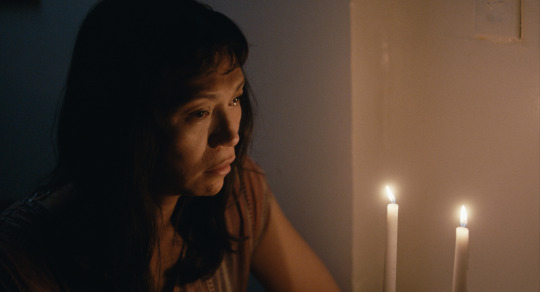
The camera work is really sensual and intimate. What conversations took place between you and cinematographer, Isaac Banks, and what, if any other films, were the inspiration for that look? He and I discussed patience and sensuality often, so that’s why Wong Kar-wai had quite an influence on my work with In the Mood for Love and also Christian Petzold, the German director, who directed Transit and Phoenix.
Lingua Franca places a particular lens on the fragility of Filipino, migrant culture. In the film, Olivia exists at the intersections of race, gender, sexuality, ICE and Covid-19—and you lay that all on the table here. What do you hope the audience will see in Olivia’s story at this time? She’s a trans woman, she is a woman of color, she is an immigrant, but she’s also more than the sum of these individual parts. I know my film demands a lot of intellectual and emotional labor, but it’s important that viewers think deeply and critically about Olivia’s motivations, which may seem contradictory and complex. I want Lingua Franca to be an emotional experience, even if it’s not the most comfortable to watch. If I get one audience member to do the emotional legwork of trying to understand where the main character is coming from, I will feel complete as a filmmaker.
What do you think is the must-see Filipino film, classic or new? [Peque Gallaga’s] Oro, Plata, Mata, which came out in 1982. It is a multi-generational tale set in central Philippines. It’s just a sprawling, dramatic epic, and it’s one of the films that made me want to be a filmmaker. It’s not the most technically polished film, but it takes risks narratively. At the end of the day, it’s not about how big the production is. It’s your willingness to be expansive and explorative as a filmmaker that counts.
What do you consider the sexiest film you’ve ever seen? Out of Sight by Steven Soderbergh.
Out of Sight?! I did not see that coming. Yes! That film doesn’t have any sex scene, but it’s the level of seduction for me. I think sensuality is not necessarily a physical encounter between bodies, but the patience and longing of the moment.
What is your all-time favorite comfort film? A League of Their Own by Penny Marshall. That was the first movie that I saw where I bawled in the last ten minutes of the film.
If I were doing a triple feature with Lingua Franca, what two films would you recommend to watch before or after? I would recommend Ali: Fear Eats the Soul by Rainer Werner Fassbinder, which is another interracial love story between a German woman and a Moroccan immigrant. The other one would be Two Lovers by James Gray, which is set by the beach.
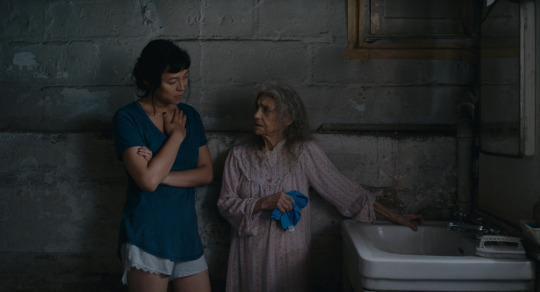
Isabel Sandoval (as Olivia) and Lynn Cohen (as Olga) in ‘Lingua Franca’.
[Spoiler warning: The final two questions concern aspects of the film’s ending.]
I thought the ending of your film was powerful, because we’re right back at the beginning of Olivia’s journey. Sometimes things don’t work out and you have to pick up the pieces and move forward. Exactly! I also wanted to make a point that even though we are focusing on Olivia, I pulled the camera back to highlight bigger sociological themes. She is one of many immigrants in the script and their fates are not resolved by the end of this movie. I wanted that to be a subtle reminder this type of thing becomes cyclical. Life goes on, it’s just another day. Olivia is a displaced immigrant woman in America where Trump is president. Whereas Olga, who’s Ukranian-Jewish, left her home country fifty or sixty years ago in the aftermath of the Holocaust. I wanted people to see this connection.
Based on the meaning of ‘lingua franca’, was that your original choice or for the title? The definition really fits the story. The film is an invitation to the audience to really pay closer attention to language—the language of things said and unsaid. That probably was also a big point of decision for me to open and close the film with words in Tagalog, which is my native language. A lot of people have asked “why didn’t Olivia accept the marriage proposal?” at the end of the film. Sure, that would’ve been practical, but I invite the audience to look at the language between Alex and Olivia. I challenge them to look beyond Olivia as just an immigrant without papers or as a trans woman looking for love, but this is a woman who is taking her agency back and her ability to determine her life moving forward.
Related content
Leonora Anne Mint’s list of Films by Transgender Writers and Directors.
The Top 100 Filipino Films on Letterboxd.
Jojo Kuneho’s lists of Tagalog movies.
Philippines: The Ultimate List.
Follow Valerie on Letterboxd.
‘Lingua Franca’ is distributed by ARRAY Releasing and is available on Netflix.
6 notes
·
View notes
Text
False God, Kaylor's New Anthem
False God - the sexiest part of the album, Lover, (similar to the flirtatious Dress in Reputation) to me personally, has a intriguing meaning. I have searched the web to see what analyses so far regarding the lyrics. Nothing much, mostly saying that it is about Joe Alwyn. Okay, let's debunk this one. 'Cause I also know that Kaylors have an interpretation from the gay's angle.
I think, I can speak on both perspectives, since I've been in both. I once married, however my biggest love life relationship was with woman. So, I am really curious to know, in what angle did Taylor actually write this song.
***
We were crazy to think. Crazy to think that "this" could work -> okay, since almost everyone out there agree that FG about love/relationship, so "this" referring to Taylor relationship (lover).
Now, don't you think it kinda strange that Taylor having a doubt about her relationship with Joe? I mean, she was 27th when she first met Joe & with enough experiences in relationship already, not to mention Joe is also coming from almost the same background, apart from different country and Joe gained celebrity status from the cinematic industry, but still I mean, what is so crazy about starting a "heteronormative" relationship like that?
Unless... she was talking about a "different kind" of relationship - something, which in general, still being perceived as 'abnormal'...
Hmmm, interesting.
But wait, there's another way to translate it, that somehow during that moment she was having an existential crisis. She questioned a lot of thing: the meaning of being celebrity i.e. she worked so hard to pursue her dream whilst at the same time she was devastated by the facts that people whom she thought once friends, stabbed her from the back - or that strangers would start to belittle & mocking her for everything - she had trust issue, she started losing confidence, she hold grudge, she was in emotional turbulance (these loosely translation based on her interviews).
Hence: she thought to drag someone to her "crazy" world would be tenacious.
Remember how I said I'd die for you? --> seems like she was really madly in love here
We were stupid to jump --> yet they've decided to taste the water anyhow
In the ocean separating us. Remember how I'd fly to you?
--> ok, again, this does fit Joe. Cause taking it in literal sense, then it probably about her had to fly back n forth US-UK.
However, Karlie still fits the role as well, I think, since they both doing a busy life, mostly continental apart.
Whoever it was for, metaphorically speaking it is about how she was making a sacrifice for the relationship to work.
And I can't talk to you when you're like this
--> later we would comprehend that Taylor was talking about a moment when her and lover had some feud. When she restrospected how during the couple-fight, her beau would:
Staring out the window
(I imagine her beau stood still, in silence, gazed through the window) avoiding to look her in the face, thus she thought:
like I'm not your favorite town
!!! What is her beau fave town?
I'm New York City
(yeah, baby!) And whose fav city is New York? Karlie Kloss!
"Well, Joe can also regard NYC as his fave city..." True - but, Taylor wouldn't be writing something that has no common reference to it. I've googled Joe's city preference and came out with null results. While as for Karlie Kloss, almost everywhere - you can find her boasting around about how much she loves NYC. As a matter of fact - she was the one who convinced Taylor to move to NYC in 2014 (and Taylor has been in love to the city, since).
Furthermore the next lyrics kinda congruent to the above speculation:
I still do it for you, babe
--> "I moved to NYC still staying here to date because of you." See, it still a close referrence to Karlie.
Can you come out with different translation that lead to Joe, instead? If you do, please let me know in the comment.
They all warned us about times like this. They say the road gets hard and you get lost
--> this one is really interesting. We all know Joe and Taylor still together and that Taylor somehow bragging about how happy in relationship she is now. But here as if like her saying that 'something happened to the couple' in FG story. Something big and terrible - something that might cause them to split/break apart.
And she kinda blame, the reason why it happened cause:
When you're led by blind faith. Blind faith
--> what is the meaning of "blind faith" in term of falling in love? Yes, when you are so in love that you are willing to do anything to retain or to be in it. You disregard everything, cause you are so drunk inside the pool of love, lust, altogether. You become 'blind'.
Ok, let's speak in het point a view, first - do you think, you see a magical spark when seeing Joe with Taylor out and about? Hard to tell? Okay, fair enough.
But here, an excerpt from Rolling Stone interview:
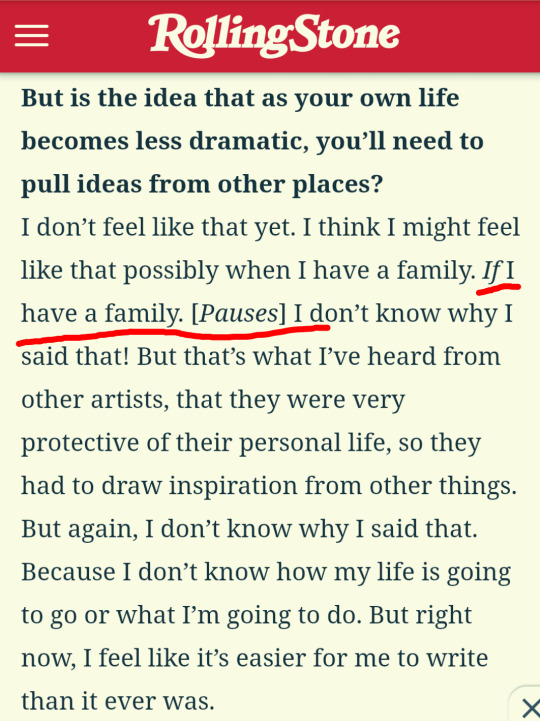
Her paused after accentuated the word "if"... to me is her showing hesitation even doubt to the idea of having a family.
Kinda weird coming from her current public image in Lover Era where she continue asserting how happy she is and how seems like, she has found the love of her life.
Further in FG she asserted that she is madly in love with someone whom she willing to die for - to fly across ocean for - so much intoxicated by love as if like having a blind faith!
Unless... the love of her life which she depicted in FG is...
in which because of that, for her to think of the ideas of: 'to be together, be a family'; would be a crazy notion and hard to imagine.
***
Yet, she also made it clear in FG, despite the odd, she was not ready to release the idea of 'stick together for good', because she thought there is still possibility that:
(But) we might just get away with it
***
The following lyrics to me, kinda raw and blatant:
Religion's in your lips. Even if it's a false god. We'd still worship.
(We might just get away with it)
The altar is my hips.
Lips & hips -> you imagine anything? (Lol).
Why False God? Clearly, she still talking about love:
Even if it's a false god. We'd still worship this love.
So in another word, Taylor using False God as a metaphor for passionate love she was experiencing with someone.
But why False God?
My take using gay perspective: is because we know how most religions condemn homosexuality. So with probably her involved in the same sex relationship, which would be considered sin or false by many, this probably her way of saying: "I don't care. I have all the rights to love whomever I want to love, regardless what society in heterenormative world would think!"
Next:
I know heaven's a thing. I go there when you touch me, honey. Hell is when I fight with you. But we can patch it up good. Make confessions and we're begging for forgiveness. Got the wine for you.
In general sense, the narrative here is about normal things happen in relationship. It's about having differences inside romance - a fight, a quarrel- then "kiss and make up".
But again, it is interesting how she chose the religious term like 'hell' and 'heaven' to equate her romantic endeavours.
This can't stop me from thinking that she actually is talking about sacred-secret love which against religious belief.
(Again, her way in saying: "I don't care your heaven or hell! I have my own, in this love-life story of mine!").
I would also like to re-iterate: "Got the wine for you" - seemingly her 'make up' sentence for her beau. But it is interesting to think about her chosen word "wine" there. It could mean literally that they both do love wine or...
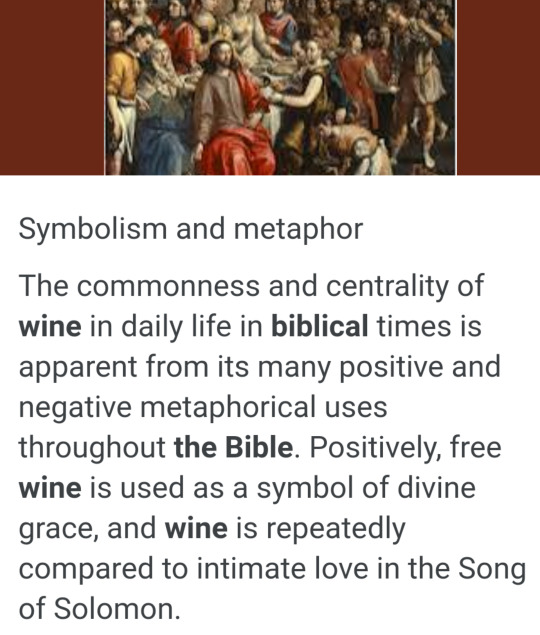
"intimate love" - ok very much correlated. Yet further from the same source (wiki), wine (alcohol in general) often perceived as "evil".
So in which way, Taylor denoted "wine"? If its in devilish way, yes, then it is another mockery from her to religious dogma as if like saying: "I don't mind being perceived as evil. Me and lover will continue doing what we are doing!"
And you can't talk to me when I'm like this. Daring you to leave me just so I can try and scare you.
Hehe, so woman, don't you think? ;)
You're the West Village. You still do it for me, babe.
A shout out to Kaylors on this. Cause west village in literal meaning is a place where Karlie once lived.

Is there any other meaning for West Village? Yes, a big maybe. But unfortunately, I couldn't find any. Perhaps, you can dig on that and tell me later?
Finally, when come back to:
They all warned us about times like this. They say the road gets hard and you get lost
--> if we persevere with Karlie's scenario - then one could imagine this depiction is perfectly suitable to the Kaylors conspiracy theory.
How we speculated that their relationship in trouble - they chose to beard for their career sake - beside continue "behind the scene" with their LOVE that worthy eternal worshipping.
Sounds too delusional?
Perhaps. But since it is still a blank space, one owns a prerogative to write things accordingly. And False God is a love letter from Taylor Swift to Karlie Kloss? I'd say ameen to that!
xxx
Update: Joe Alwyn Fave City (thank you @dodsdmr for this info)
#kaylors#kaylor#debunking kaylor#joe alwyn#karlie kloss#album lover#lover era#taylor swift#false god#taylor lyrics#false god meaning#false god lyrics analysis#taylor swift's song analysis#swifties
105 notes
·
View notes
Text
Having just finished Tevinter Nights, I have un fucktonne of questions and theories. But, below are a few of the subjects/problems that I can’t stop thinking about. I’m curious how other people interpret them, or if I’ve missed some critical details, because it seems like there’s some retconning going on.
so, spoiler warnings apply, since i’m about to discuss the Big Doings below the cut.
The most immediately relevant items come from the final story, right? BUT, because of the nature of the characters, I sort of assumed that much of “The Dread Wolf Take You” is a study in unreliable narrators. Can any of the tales be believed after Charter exposes the Bard? Do we move forward assuming the puzzle pieces we’re trying to fit together are the correct ones, or tread carefully on the word of a known liar?
Nothing about the Assassin’s Tale fits the facts we know:
Meredith’s corpse didn’t actually stay in the middle of the square in uptown Kirkwall. Her remains were taken away to The Black Emporium. (iirc, Varric mentions this in one of the recent comics)
Pieces of her sword (Certainty) were re-forged for Samson to use in service of Corypheus, a sword which eventually passes to the Inquisition.
A shard of the idol continues to exist outside of Meredith’s remains, or her re-forged blade. Depending on worldstates, the shard is either a weapon rune--forged by Sandal and given to Hawke--or it was given to Varric (who then gave it to Bianca to study, I think).
In the comics, and in a few of the short stories, the fiasco of Fen’Harel’s agent losing the red lyrium “item” is cleverly handled from a lore-continuity perspective. It’s only ever referred to as a “weapon,” which could mean a lot of things, and allows for greater freedom in describing it in later media. Until the Assassin’s Tale, I firmly believed they were talking about Certainty. Now we’re supposed to believe it’s been the magically re-formed Primeval Idol this whole time, freshly revealed (by the equally untrustworthy Mortalitasi) as a go-go-Gadget ritual blade.
So, are the Tales a cheeky narrative lie, or is it all lore retcon? If it’s a retcon... -What ritual could the blade have originally served? -Might it actually be a key, as lots of people have theorized? -Is there really a potion that can melt lyrium? -Does Solas actually have the idol now, or was his entire story a lie to cover the truth that he still hasn’t found it?
Also, uh. . .Can Solas just. . .kill people while they sleep/dream, even dwarves? I mean, he has demonstrated the ability to create a “dreamlike” state for a dwarf Inquisitor. But, this power seems OP, even for him, and narrative reach. Possibly it’s further evidence that nothing in “The Dread Wolf Take You” can be trusted. 1. If the plans for the Fade are already underway, what does this mean for people like Evangeline, Anders, Grandin, and Sigrid, who’re possessed by spirits/demons? It’s possible they’ll be forcibly separated. Those (like Evangeline) who’re only alive because of their spirit, will likely die. Without Justice, Anders might finally succumb to the taint.
There are probably thousands of people across Rivain and Seheron, and among the Avvar and the Dalish, who’re contentedly hosting spirits. Would these spirits allow their mortal hosts to be harmed by Solas? Or could there be resistance to his plan from the Fade side of things?
Lots of the stories in Tevinter Nights include the theme of outliers breaking ranks from within a seemingly monolithic society: the Ben Hassrath don’t support the Antaam in their campaign, the Venatori and their supporters operate in defiance of Tevinter, the Crows had one of their Talons disrupt a centuries-old pact.
Going forward in the next game, we might see a spirit faction that, for any number of reasons, acts against The Dread Wolf’s plan to sunder the Veil.
2. Why does everyone in this book describe the red lyrium idol as having only two figures, when every depiction of it that we’ve seen clearly shows three? The crowned figure is (if Solas is to be believed) comforting one person, but no mention of the other poor soul, an even more skeletal figure who seems to be missing their left forearm, and is stuck on the other side of the large ring. No love for that dingus, I guess. Very curious.
And no mention of the serpentine shape that surrounds all three of them.
3. The sea is going to be a big part of the next stage of this story.
-Mythal’s origin has her emerging from the sea. -In “Luck in the Gardens, the 8 Venatori who were tasked with keeping the “formless” monster in its sealed prison each wore a clay amulet depicting a thin four-winged dragon rising above a sea. -“The Horror of Hormak” describes the viscous gray transformation fluid (and the monsters it creates) as stinking of brine. -The Mortalitasi’s Tale includes a reference to The Dread Wolf screaming about the Sea of Dreams. -The Executors appear to be stepping into the action, finally. They are known as ‘those across the sea.’ -Among the murals discovered during Trespasser, there are some that include imagery of flowing water: The Death of a Titan, and Lifting the Vallaslin -Before ascending to godhood, Ghilain’nain killed all of her creations. . .except the giant monsters in the deepest waters. Lore says “Pride stopped her hand,” which could mean that she spared them because she was too proud of how perfectly-made they were. Or, that an aspect of Pride (as a demon or spirit), convinced her to let them live.
4. I’ve always thought that the painted murals of Trespasser and those completed at Skyhold are actually of a different sort, in a very specific way. Much of the ornamentation, symbology, and iconography that’s used in the various frescoes in Trespasser. . .isn’t found in Skyhold’s frescoes. My feeling, based on these differences in style, and the uneven quality of the paintings in the Vir’Dirthara, is that the murals in Trespasser have been painted-over.
-Thanks to Gatsi, we know that the mosaics we worked so hard to complete for the Inquisition were all re-carved by several hands over the ages, making it difficult to get an accurate interpretation from them.
-During “The Horror of Hormak,” Ramesh and Lesha encounter mosaics depicting elven kings and queens, and their subjects. But the mosaics shift and change the longer they stare at them. The scenes transform from a glittering parade of nobility offering succor to their subjects. . .to a death-march of tyrants forcing magical torments on their slaves.
-In “Genitivi Dies in the End,” our industrious well-traveled Brother is humbled when he discovers an elven tome that depicts the continent of Thedas in superior and, crushingly, more correct detail to anything he’s ever seen. Which means that either the continent has changed dramatically, or all the maps that exist in modernity are based upon a flawed (altered) source.
There’s an established trope of people from all parts of Thedas altering relics in order to change history’s interpretation of them. So, why would the frescoes/murals be any different? I believe that either Solas, or someone loyal to Solas, altered the murals in order to obscure the truth behind them.
If we believe Philliam, a Bard! (though, again, an unreliable narrator), the Qunari Rasaan disbelieves all of the names attributed to Solas, either by his enemies or himself. As Philliam posits, to know Solas’ true name would be know the best and worst of him, his flaws and weaknesses, and what he’d “failed to be.”
Essentially, I think we’re being misled at every turn. And this leads me to. . .
5. None of the stories in Tevinter Nights expands on the role of dwarves in past and future conflicts. We get lots of new and juicy stuff on Tevinter, Nevarra, mages, elves, the Crows, the Lords of Fortune, even the Qunari. Noticeably and glaringly absent is any mention of dwarves, titans, and how they fit into the unfolding lore.
One of the largest and most influential groups of dwarves in all of Thedas (The Ambassadoria) lives right in the heart of Minrathous. Above ground. Vulnerable to the invading Qunari and Fen’Harel’s agents.
Dwarves are as tellingly absent in this set of stories as dragons were in all the Evanuris revelations.
The one place where those two things intersect. . .is out in the Hissing Wastes, near the Sunstop mountains (which has always sounded to me like the same naming convention as Skyhold).
Out there, we come across a dwarven thaig, the only thaig to have been built above ground, that pre-dates the first Blight. It’s called Kal Repartha, which means ‘a place where we may meet in peace.’ Paragon Fairel and his sons appear to have built the thaig as a way to escape some huge conflict in the Deep Roads.
Statues of Mythal’s dragon form are arranged in places of honor outside Fairel’s tomb. As if in protection.
Fairel was a rune-smith, one of the greatest who ever lived. Mythal might have worked with Fairel toward some common goal, relying on his skills to make devastating weapons, runic keys for hidden places, or repositories of knowledge best kept secret. She might have protected Fairel as a respected friend and ally.
Reaching a little deeper, Mythal may have helped separate the ancient dwarves from the hivemind control of the titans, freeing them to create their own vibrant society, far from the “witless, soulless” existence they lived as drone-like workers.
(As an interesting aside, Fairel wrote about dragons, proving that dragons, dwarves, and the Evanuris existed at the same time)
It just seems like the root of this unfolding elven lore is the Titans themselves, the life they created in the dwarves and the tangible world, the innate power of their blood, and the knowledge that was stolen from them. Why don’t dwarves feature more heavily in the anthology?
That’s it. That’s my tinfoil haberdashery at the moment. Thoughts? Corrections?
15 notes
·
View notes
Text
The Not-So-Amazing Mary Jane Part 6: AMJ #1
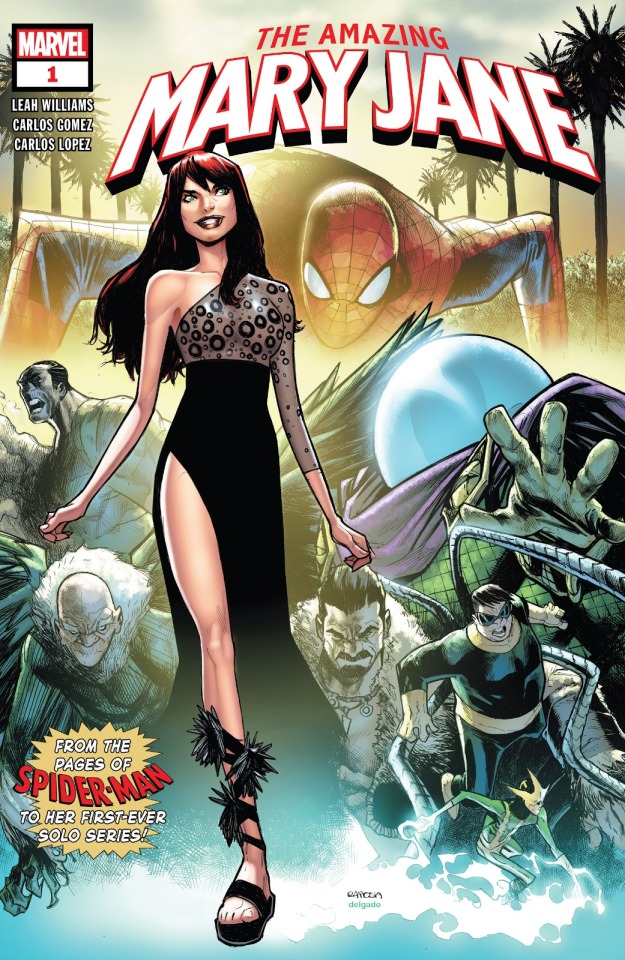
Previous Part
Next Part
Master Post
Now we’ve finally established all necessary contexts we can begin diving into the AMJ series proper. My intent is to break down each issue page by page.
Let’s get started.
We open with Mary Jane shooting a sizzle reel for the film’s investors. Evidently she is playing Mysterio’s super powered love interest.
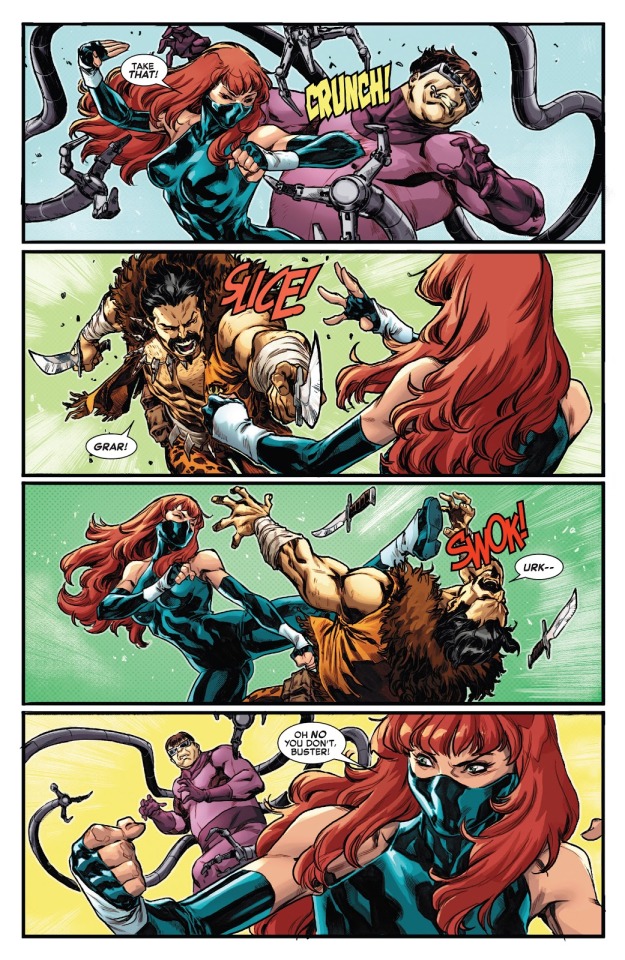
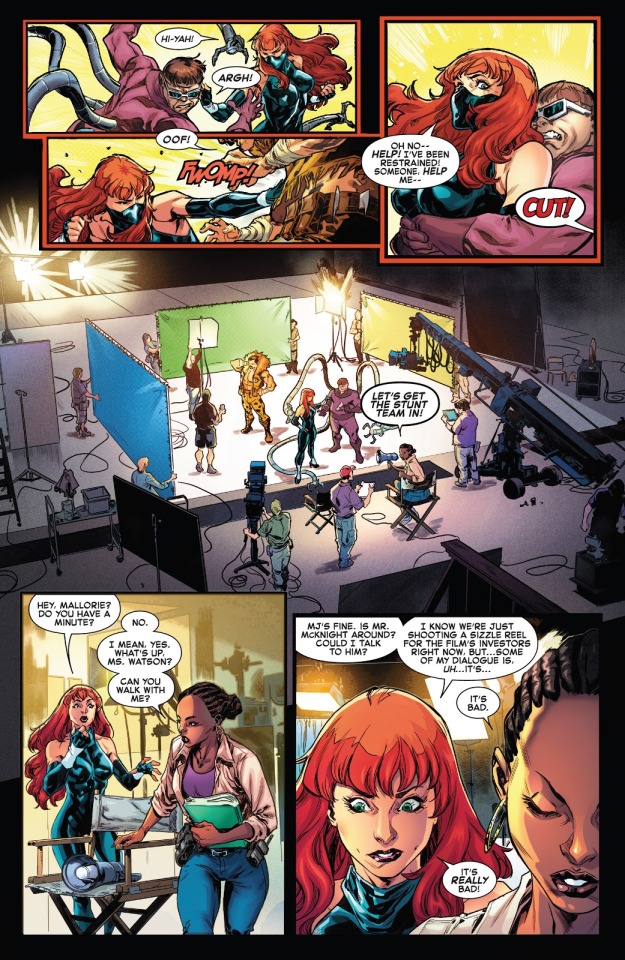
Here we get into our first few problem but I admit it might not actually be a problem.
See, ASM v5 #29 established that MJ has already seen McKnight’s ‘reel’ so why are they filming another sizzle reel?
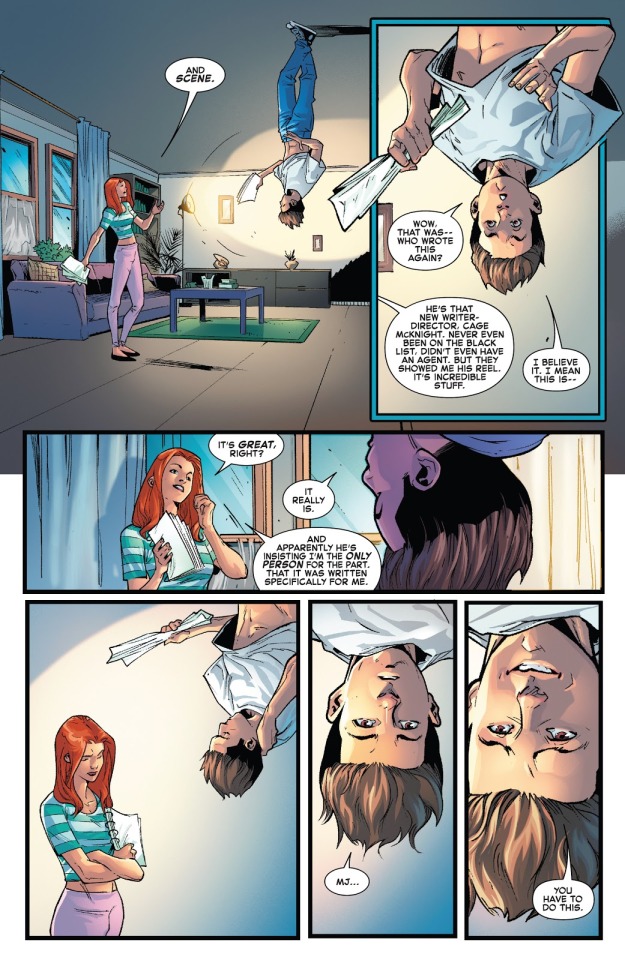
I admit to being in the dark about Hollywood practices so this might be perfectly normal and therefore not a contradiction. Let me know if that is the case.
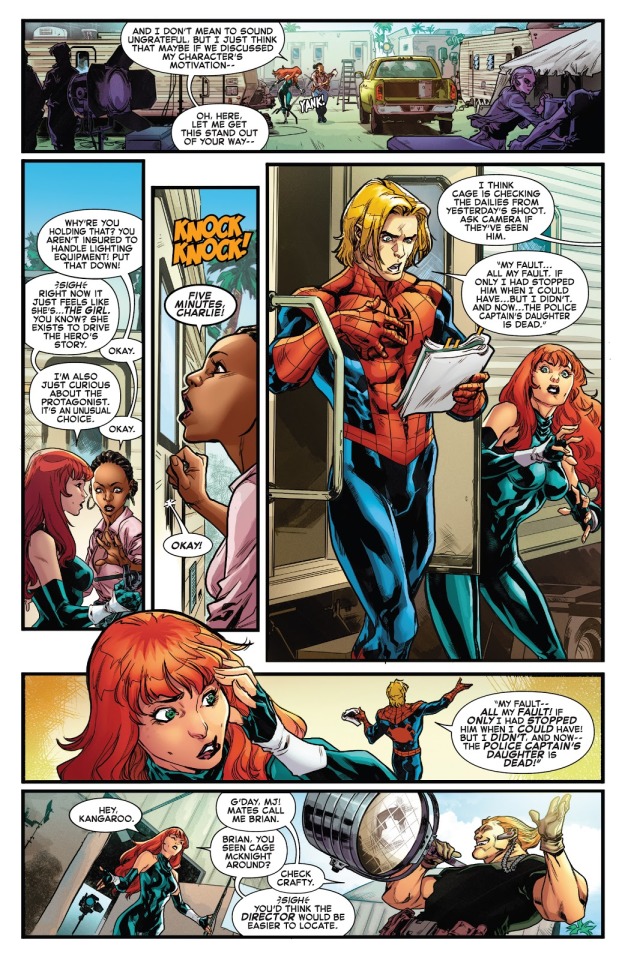
This page introduces yet more problems though they too are rather minor.
The smallest of these is depicting Kangaroo as Australian. Last I checked (and I admit I might be mistaken about this) the Kangaroo was in fact NOT Australian. Or at least this version of the character isn’t as he is the second Kangaroo merely inspired by the original.
That’s a tiny nitpick but I thought I’d mention it. And it’s one that’s easily explained away. He could be emulating an Australian accent for effect or something like that.
The more notable problem is that MJ is deriding the script. This contradicts MJ’s statements in ASM v5 #29/830 where she is praiseworthy of the writing after immediately reading through some of it with Peter.
You could argue that perhaps MJ was commenting upon the script in general and not specifically her own part. As in her starring in this movie would be great for her career because the movie in general was looking to be great. Or alternatively the script for the sizzle reel was bad.
But consider that the script is directly based upon Webspinners #1-3, which (again I might be mistaken about this too) I do not recall ever featuring Mysterio’s would be lover as anything like a super heroine.
Again, this is reconcilable. Rewrites happen. Embellishments on the truth happen.
But to me the reality seems be that either Williams was unaware of the movie being based upon Webspinners (which is entirely possible) or that she wanted to go in another direction for the story.
Either way, it’s a weakness of the comic book but not a deal breaker of a problem.
This page also represents one of the problems from an analytical standpoint with this series.
There is a certain amount of ambiguity through the writing and art in regards to what Mary Jane (and other characters) might be thinking and feeling.
Look at MJ’s baffled face when looking at the Spider-Man actor on the above page.
My initial impression was that she could be simply weirded out by seeing an overdramatised version of her lover. In particular when he’s going over a tragic event in his and her own life (Gwen’s death).
It could just be bafflement over why that’d even be in the movie. After all what has Gwen’s death got to do with the life of Mysterio. I guess Spidey’s implication in Gwen’s death was public knowledge but it still has nothing to do with Beck.
Alternatively that facial expression might (and I emphasis this as speculation) represent MJ’s confusion and concern about that being included in a film. That is to say that’s something of a personal cut for Spider-Man and Mary Jane’s life. She could be wondering if someone knows the truth about Peter’s identity?
If the latter is the case it might go some way into alleviating and explaining other problems I have.
But I just don’t know, because the comic is not making it clear-cut. To my eyes that look says ‘this is so surreal’ and doesn’t say ‘This is concerning. Could Peter and I be in danger?’
However if that was the intention it might’ve been intended to then organically transition into the acknowledgment that there are literal super villains on set and the consequent page in which MJ comments that Cage McKnight fleeing is suspicious.
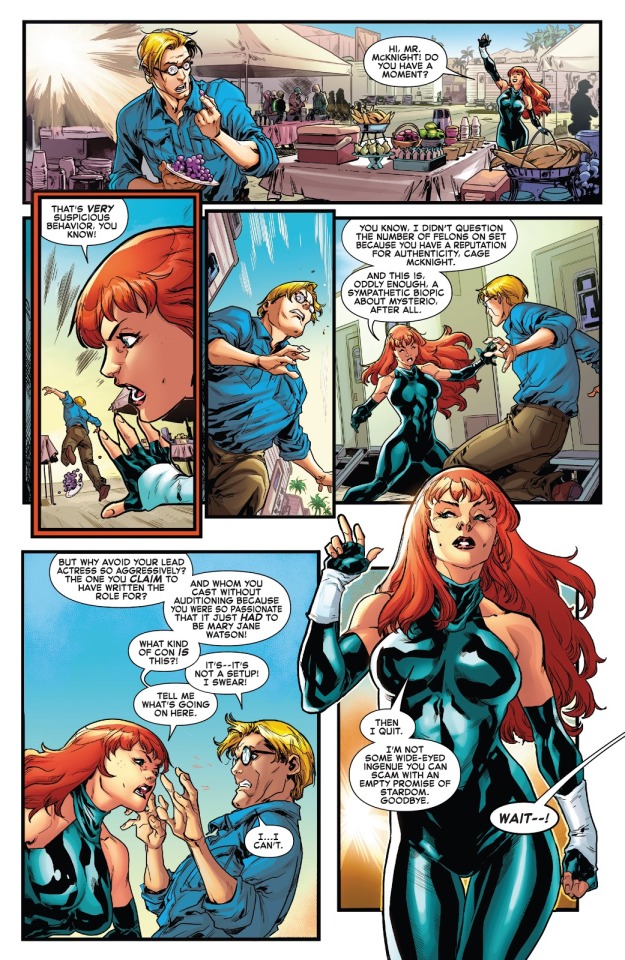
Here is where we’re starting to get into the bigger problems, but let’s start with a smaller one.
The scene implies that McKnight is a an actual person and a respected filmmaker. This is again contradictory to ASM v5 #29. There MJ referred to McKnight as very new, as someone who lacked an agent until very recently. The implication by Spencer was clearly that McKnight was a false identity that Beck invented. Williams/the editors is clearly ignoring that. That’s not a good sign, although it’s not irreconcilable. It’s entirely possible that MJ’s dialogue in ASm v5 #29 in-story was actually true.
Mary Jane comments that there are felons on set. She didn’t question this because Cage McKnight has a reputation for authenticity.
This line can be interpreted one of two ways.
a) MJ didn’t question actual criminals on set and didn’t do anything about it.
Or
b) She phrased herself badly and what she meant was former felons, or that she presumed they were reformed/reforming felons.
The latter is a-okay, the former though....wtf?
MJ’s lived with a man who she knows spent most of his life torturing himself over allowing ONE criminal to walk free. She’s on set with a whole crew of criminals, including super villains and she’s shrugging it off? She’s not even questioning it?
‘Authenticity’ be damned, it’s illegal and potentially dangerous to knowingly harbour criminals, let alone super powered ones.*
But again, I’m willing to give the benefit of the doubt on that line. Between Cage’s reputation and the fact that so many criminals are working out in the open its not unreasonable for MJ to take it on faith that everything was on the up and up (even with the presence of super villains). After all the only confirmed super villain on set is the D (or Z) lister the Kangaroo who has at times been one of the good guys.
Mary Jane though is smart, socially savvy, can get a decent read of people and did study psychology for a time (she never completed the course but still). So she can tell something weird is up and it’s clear the intention is that she’s been growing suspicious for a while now.
In this essay series I don’t plan on praising the issues as that’s not the point. Besides I do that in other posts anyway. Nevertheless it’s worth pointing out that Williams really hits the mark on MJ’s personality here.
Her statements about Cage ‘claiming’ to have written this role for her (where she conveniently plays the love interest to a super person) and simply handing it to her imply MJ is detecting a trap. This touches on what I said above about her facial expression. About how it’s possibly intended to float the idea that she’s concerned that someone’s figured out Peter’s secret.
However, she could just as easily be thinking this is a trap specifically for her. After all, she’s been targeted by stalkers before (like Jonathan Caesar). That interpretation is arguably supported by MJ’s line about being scammed with an empty promise of stardom. Even if she doesn’t think this is some kind of super villain grand scheme of any kind it’d likely ring alarm bells for any young and (by stereotypical standards) attractive person in Hollywood; at least it would nowadays.
As we move onto the next page Cage reveals himself as in fact Mysterio and confesses he engineered this con in order to tell his life story.
He proceeds to inform MJ what is and isn’t real about the film and explain where the real Cage McKnight is. In doing so he admits that the film is happening through fraud, identity theft (sorry I don’t know the correct legal terminology) and the hiring of former felons and active criminals.
More specifically he produces (what he claims to be) a live video feed of the real Cage McKnight’s location on the Falkland Islands where he will be spending around a year on a film project that doesn’t actually exist. He also claims that this project is his last chance to do something good with the ‘time he has left’ (implying he is dying) and that he wanted to give the felons and criminals a similar chance to make something good and meaningful.
After being honest with her, MJ admits this situation is insane, but then agrees to go along with it.
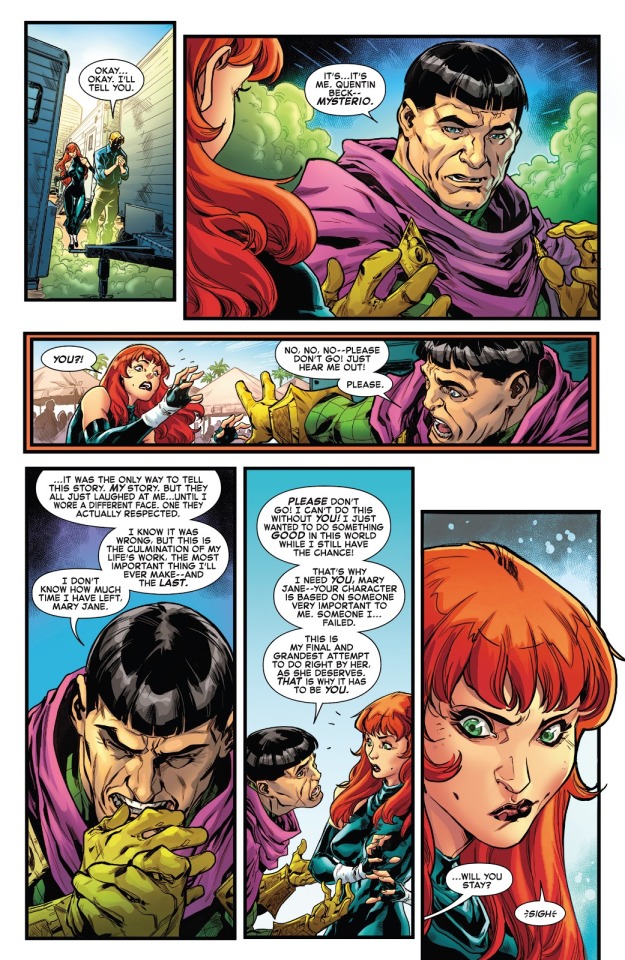
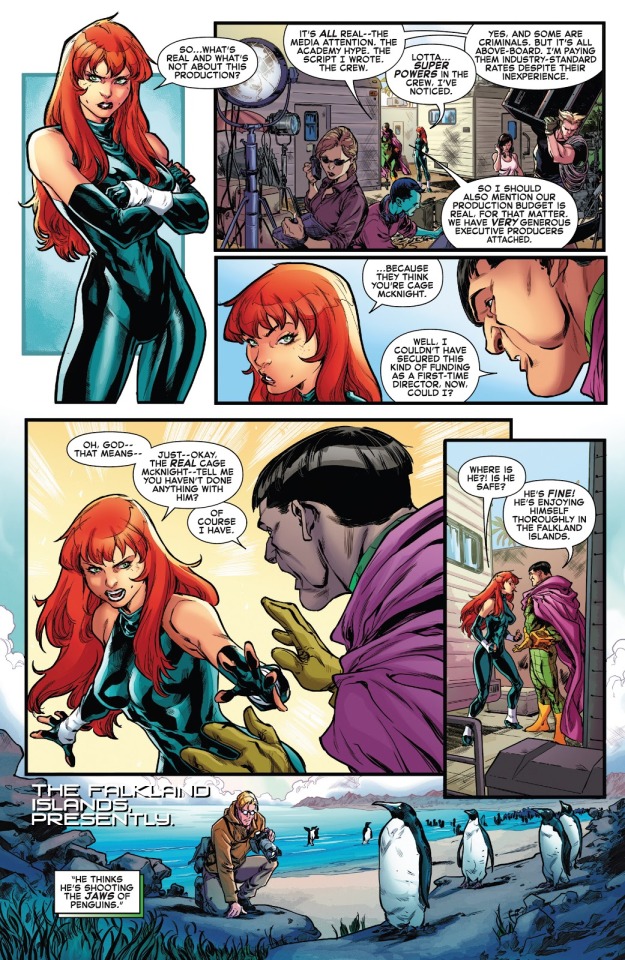
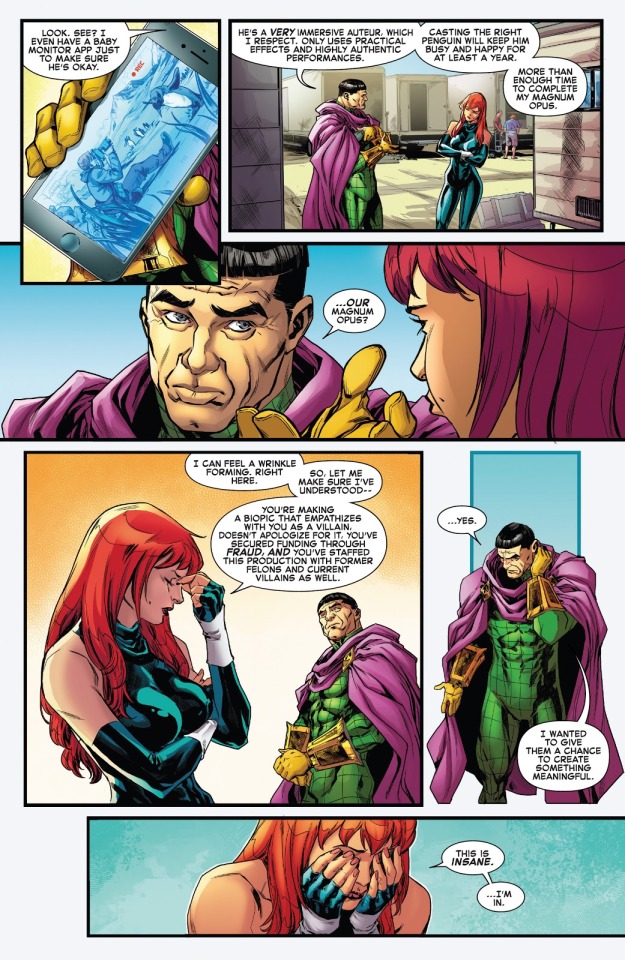
First of all let me get this out of the way. Mysterio has actual active criminals on set but he also wants media attention. Isn’t that counter productive? The media are going to report that (some of the crew are obvious more than human, with green skin no less) and it’s going to cause both unwanted attention from the authorities and problems in general.
With that said let’s talk about the bigger issues with these pages.
Part of the problem in analysing them is that it we have to consider things from the POVs of MJ, Mysterio and our own (which is semi-omniscient).
We know Mysterio:
Is in the employ of the demonic Kindred who’s working a vendetta against Spider-Man.
Faked his own death again back in ASM v5 #24-25
Is doing this movie to make the most out of his time before he is dragged back to Hell
Is aware of Peter’s identity and that it’s highly likely he demanded MJ’s inclusion in the movie (whether of his own volition or on Kindred’s orders) specifically because of her connection to Spider-Man
Essentially we know Mysterio’s reasons for making the movie (including his limited time) are true…but they also omit certain important facts.
In other words…he’s acting.
He has legally (and more often illegally) worked as an actor. He was able to fool executives who literally work in the film industry where actors are basically a prerequisite. He is a massively skilled manipulator.
And here, the context the audience are aware of, conveys that he’s using the truth to get what he wants but is nevertheless withholding the real truth. Maybe this will be addressed later but at the moment it is beyond unlikely that Mysterio truly felt MJ was simply the only person to play his love interest. She is obviously there because of her connection to Peter.
Me personally though, I am not exactly certain Williams wrote this moment with the idea that Beck was being actively deceptive. My personal impression is that she was writing Beck as sincere and simply vulnerable because he knows he'll be returned to Hell soon. This vulnerability would be the reason for his opting for honesty. Now I don’t have any evidence to back that up I will admit, we will have to see as the series progresses.
But the most important thing about this scene isn’t our POV nor Beck’s, but MJ’s.
She is the lead character the person the story revolves around, her actions, decisions and agency is what is paramount in the context of this series.
From that perspective these three pages alone put us several layers into serious mischaracterization.
MJ wouldn’t help Beck because he’s hurt her loved ones
Even if he hadn’t she wouldn’t trust him because of the other horrible things he has done that she knows about
Even if she didn’t know about those things she knows his M.O. and abilities and thus wouldn’t trust him
Even if she sensed sincerity she’d not help him because he’s committed and still committing several serious crimes and unethical actions in this very story
Even if she believed those crimes weren’t so bad and that he was sincere she’d be smart enough to consider the possibility that he’s tricking her and double check what he’s told her
If she presumed (not that there is any evidence of this in the comic) that Beck was out legally and she ignored him obviously engaging in identity theft, she’d still double check those fact and learn that he has in fact escaped.
No matter how you slice this Mysterio is very much in the wrong here and so is Mary Jane. She even admits it’s insane and then agrees to go along with it.
Not only is she out of character to nuclear levels but even if this was a completely new villain MJ had never heard of before the mere fact that he’s clearly committed serious crimes to get to this point and is going to continue to do so (chiefly by impersonating McKnight) should be enough to make her her to bow out.
There is soooooooooo much more I could write about this because it cuts to the heart of the problematic premise as presented by the issue. However I will dive more deeply into that in numerous future instalments once we are done with issue #1.
Moving onto the next few pages, MJ predicates her agreement on the condition that her role be rewritten to improve her character.
This is a fact that she explains will actually improve the film over all. Their discussion occurs as Mysterio gives her a tour of the set and they chat about rewriting her character.**
During the course of this tour Mysterio unveils some of his film techniques and (at least seemingly) confirms what is and is not real about the production. Among the techniques he is using are his incredible holographic technology and his robot duplicates of the X-Men from ASM Annual #1.
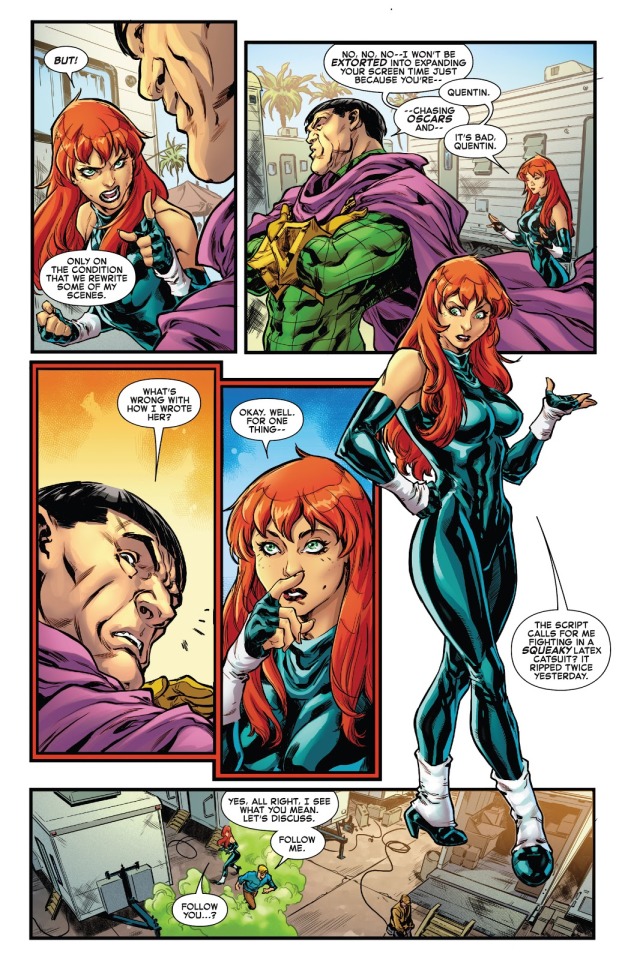
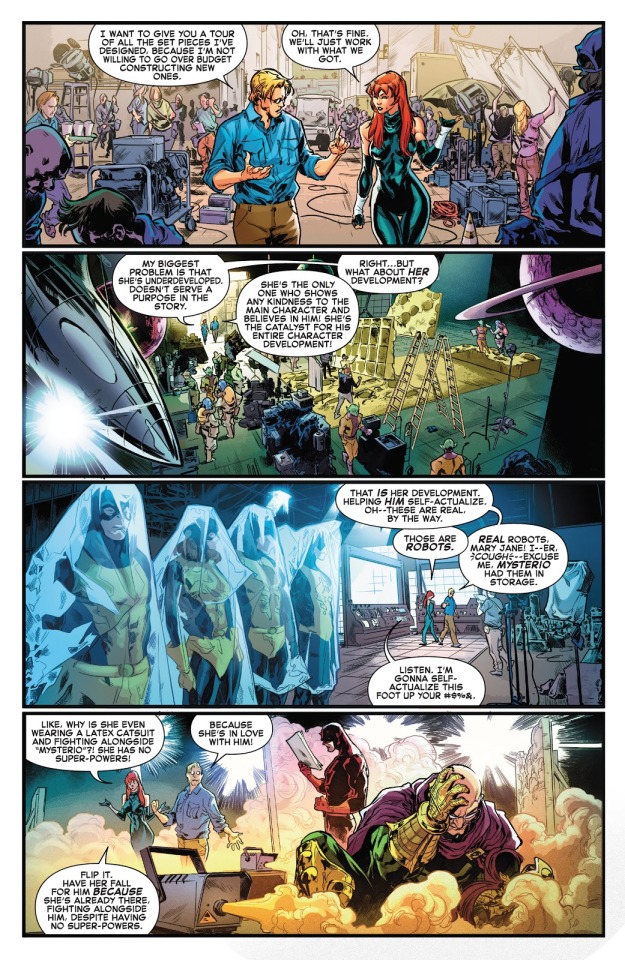
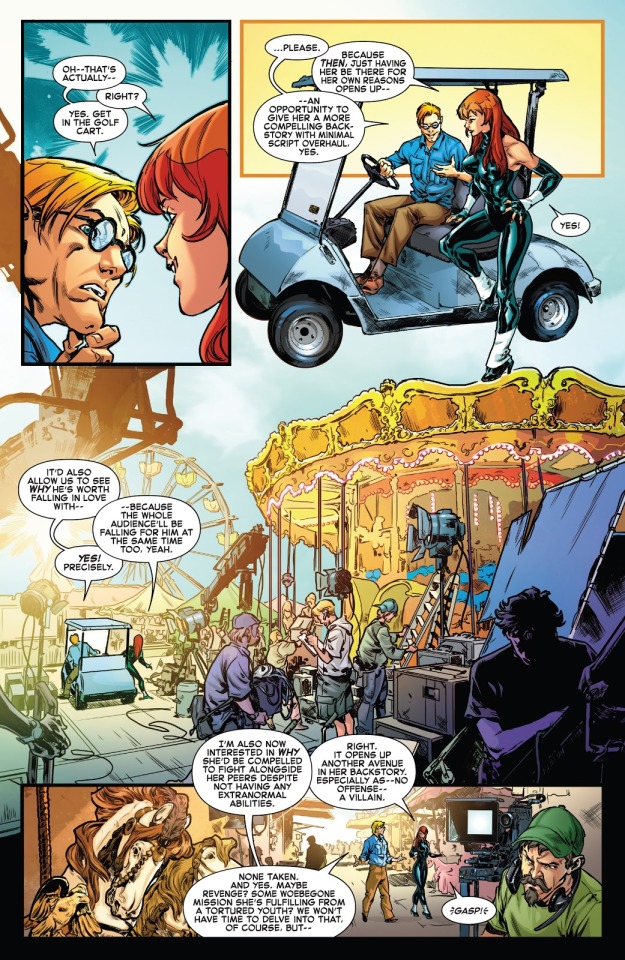
This tour also includes a direct reference to Mysterio’s suicide from ‘Guardian Devil’, implying the artist and editor at least are aware of the events of that story. I’d like to imagine Williams is too. Regardless it’s problematic for the comic to acknowledge those events but treat Mysterio sympathetically in light of what he did in that story. And needless to say it’s problematic to write MJ as so chill around Beck in this scene/comic given how she knows about those events because she was in the story!
Anyway, MJ gets excited by the prospect of a spin off sequel. That in turn prompts one of the crewmen to imply she got her job through ‘womanly wiles’.
This enrages ‘Cage’ who assaults the man, an event witnessed and recorded by the surrounding crew. As she witnesses these events her self MJ has a curious facial expression.
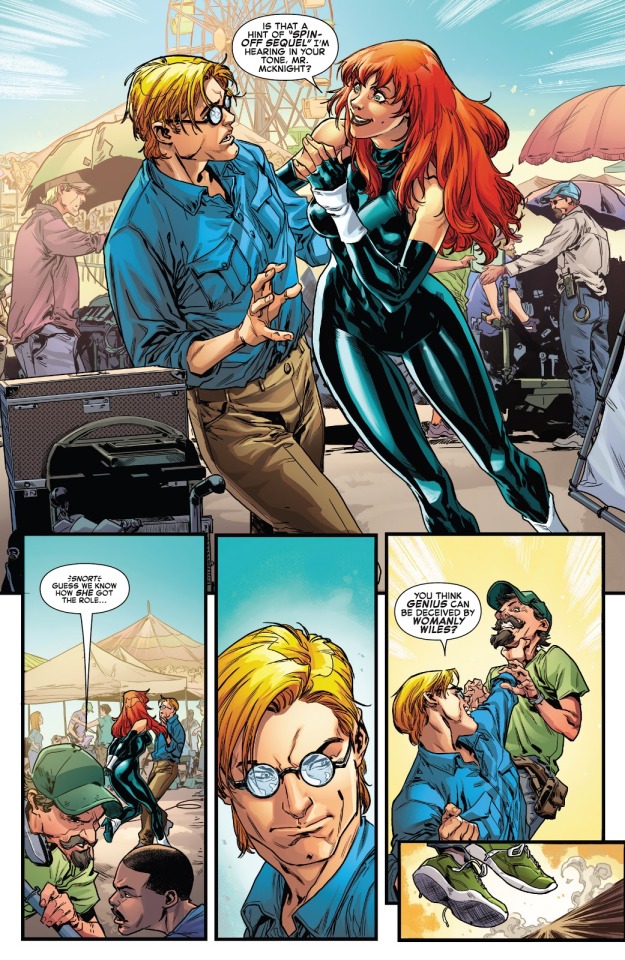
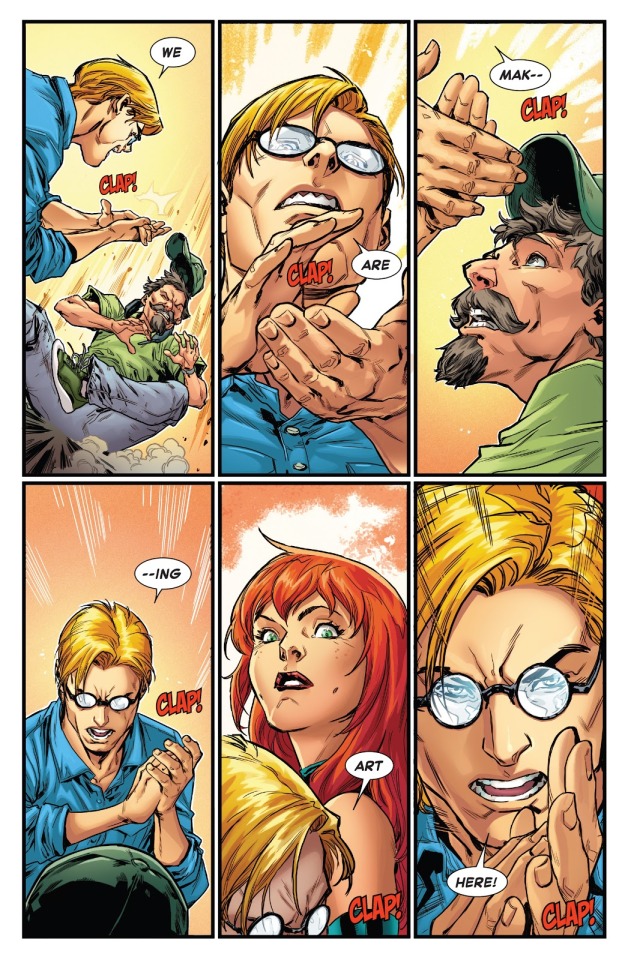
Much like her expression seeing the actor playing Spider-Man, MJ’s face here is difficult to interpret.
It could mean any number of things.
Could she be viewing Mysterio as someone she’ll have to play carefully?
Is she thinking she’ll have to do her best to ensure he doesn’t get out of hand, whether it’s for her own protection or others’?
I do not know. It’s kind of vague. Hopefully it’s meaning will become clear in consequent issues, but if I’m supposed to understand clearly what it means in this issue then Williams or Gomez dropped the ball.
Something they didn’t drop the ball on though is Mysterio’s characterization. It’s worth mentioning out of fairness that this emphasis upon Mysterio as a passionate artist is extremely in keeping with his character and Williams handles him expertly on this front.
Beck finishes up his tour with a recreation of a scene from ASM #66-67 and MJ is delighted by the fun she and Mysterio are going to have in making the movie.
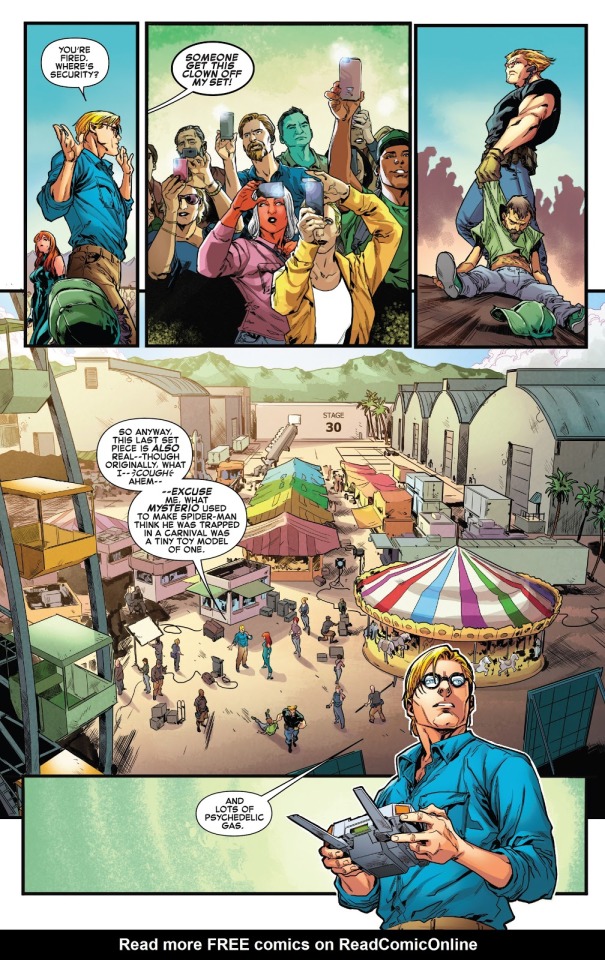
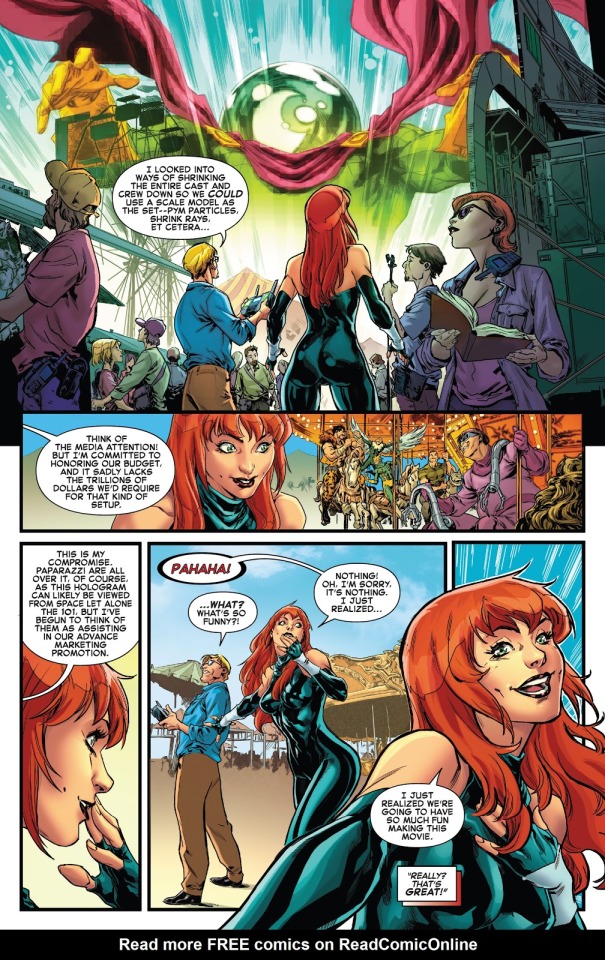
Notice that Beck directly references how this set piece is recreating a trap he laid for Spider-Man, how he used psychedelic gas to trick his mind.
In essence this is Mysterio simply stating outright to Mary Jane that he once tried to harm her boyfriend and even drugged him to that effect.
And MJ’s reaction to this is…to giggle with glee.
Really?
She doesn’t even show any hint of apprehension over that? We the readers aren’t even made privy to an internal tensing or recoiling on MJ’s part to this man just casually mentioning a time he sought to end the life of the man she is in love with?
Seriously, what the fuck. You better believe we’ll be talking more about this too.
Even from Mysterio’s point of view it muddies the waters of his motivations. As we extensively examined in prior instalments, it’s very likely that Beck knows Peter is Spider-Man, and thus by extension probably knows that Mary Jane is his lover. So it’s incredibly stupid on his part to blithely mention to MJ a time he drugged Spider-Man and tried to kill him.
Alternatively let’s say Beck’s hiring of MJ was in Kindred’s orders and he is unaware of the exact connection between her and Spider-Man/Peter. It’s still stupid because he’d still be able to deduce she very probably has something to do with Spider-Man because he knows Kindred wants her out of the way as he wages war on the wall-crawler.
The fact that Beck is written this way indicates Williams is unaware of the Spencer ASM issues which set up AMJ and/or doesn’t care and/or the editors aren’t doing their due diligence . Regardless it’s a major weak spot of the story. It either breaks the larger narrative that exists between the two titles or it renders Beck out of character via his stupidity.
The latter would be true even if Beck simply wanted MJ in his movie just because he liked her as an actress. He’d still be throwing out the fact he drugged and tried to kill someone (a former Avenger no less) in his past.
As the story progresses MJ and Peter have a chat on the phone where she makes a point of alleviating any discomfort he might have over making a sympathetic Mysterio biopic, claiming it is the Breaking Bad of super hero films. She continues by pointing out the career opportunities the role presents.
Peter raises concerns for MJ’s safety, suggesting she might find herself surrounded by villains; ironically unaware that Mary Jane is in that exact situation.
MJ assuages his concerns by reminding him of the time she defeated an actual super villain (the Chameleon, though he goes unnamed) with just a baseball bat.
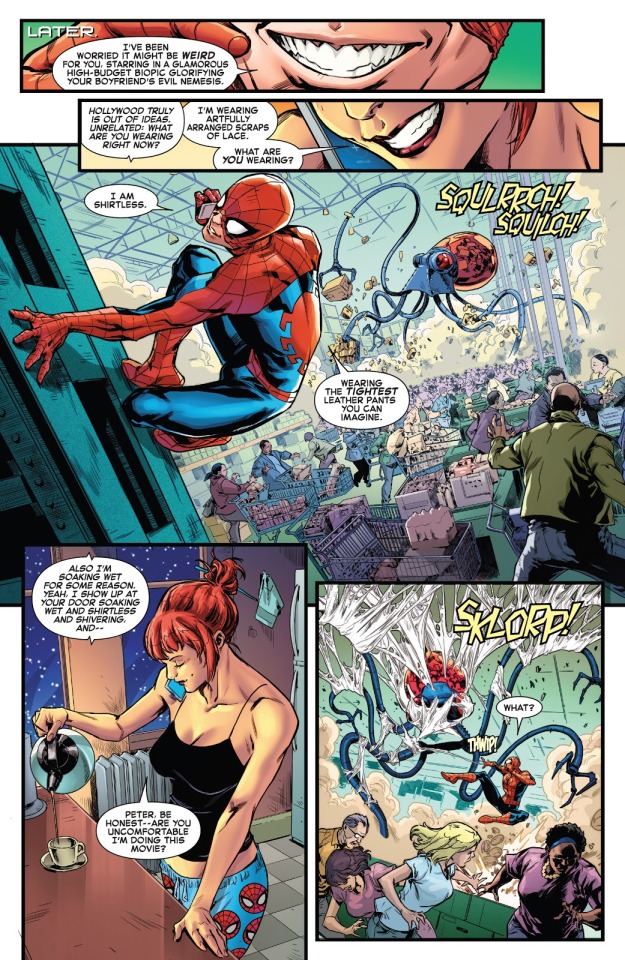
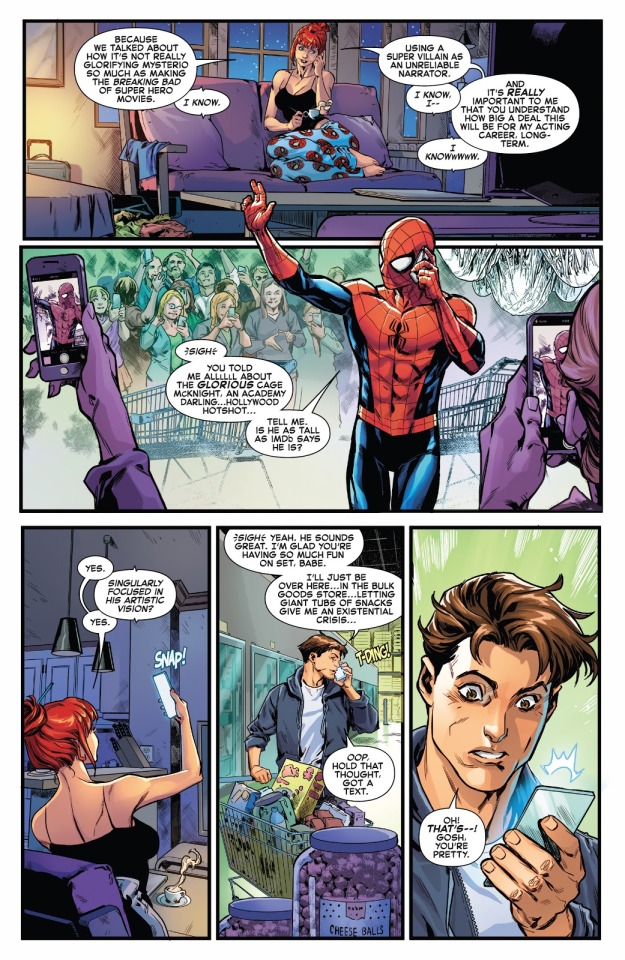
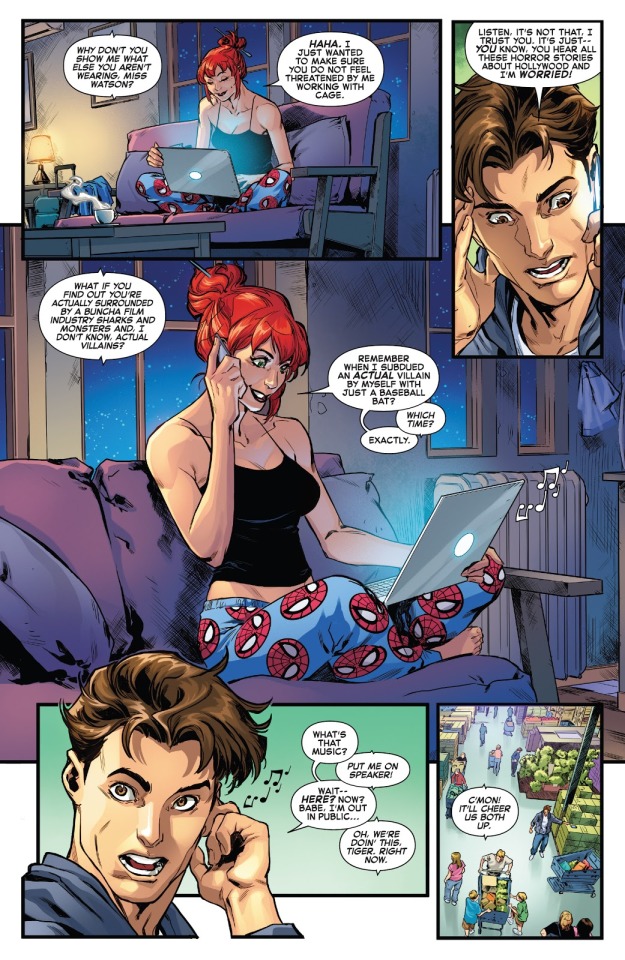
MJ’s statements regarding the movie are arguably contradictory.
Earlier in her conversation with Beck MJ stated that the film empathizes with Mysterio and doesn’t apologise for it.
But then at the end of the story she tells Peter that the film actually isn’t glorifying Mysterio. Rather, it is making the Breaking Bad of super hero movies with an unreliable narrator.
This isn’t necessarily irreconcilable, but it is somewhat poorly communicated on Williams’ part. Breaking Bad’s defining message was that you shouldn’t be like Walter White. That he was in the wrong, even from the very start.
Why would Mysterio ever write a film about himself in that light? It doesn’t make sense and it would contradict MJ’s dialogue about how the movie empathises with Mysterio as a villain and doesn’t apologise for that. Breaking Bad wasn’t empathetic towards Walter White, it showed him very clearly as a monster and its final episode had him admit that fact.
Moreover if the film empathises but never apologises for Beck (and is directed by him personally) then isn’t that tantamount to glorifying him?
Because of this the issue leaves us with three possible interpretations of Mary Jane in this moment.
She is either:
Blinded by the prospect of fame and/or fortune and/or excitement and as such cannot see that the film obviously is glorifying Beck. To an extent we’ll talk more about this in a future instalment. Suffice it to say that’s very out of character
She is outright stupid, which is also out of character
She is deliberately lying to Peter about the artistic nature of the film project. There is a strong case (that we will get to) for MJ lying to Peter about Beck being out of character for her. However, were this a regular film production it might not be an OOC move for her. She wants to make the movie and alleviate her boyfriend’s feelings for the moment. Fibbing to keep their long distance relationship healthy and happy and hopefully being more straight with him when it’s over is not an unreasonable thing to do.
Options 1)-2) don’t exactly paint Mary Jane in a positive light, nor does option 3) necessarily.
MJ just isn’t this stupid, isn’t this capable of being star struck (she’s seen too much serious shit in her time for that) and lying to the love of her life about something like this is questionable. On the latter point it can be argued that there’d be no advantage of her lying to Peter about the project because he’s obviously going to find out when the movie is released.
Personally I suspect Williams never intended to imply any of the above interpretations.
I think she or the editors just didn’t catch that the dialogue at the end of the issue contradicts the dialogue from earlier. Which would be bad writing/editing but not demonstrative of Williams not fundamentally understanding the character. On occasion Stan Lee himself mischaracterized Spider-Man by accident.
Nevertheless a moment that reflects badly upon MJ.
The last moment from this scene involves a ’20 second dance party’ between MJ and Peter.
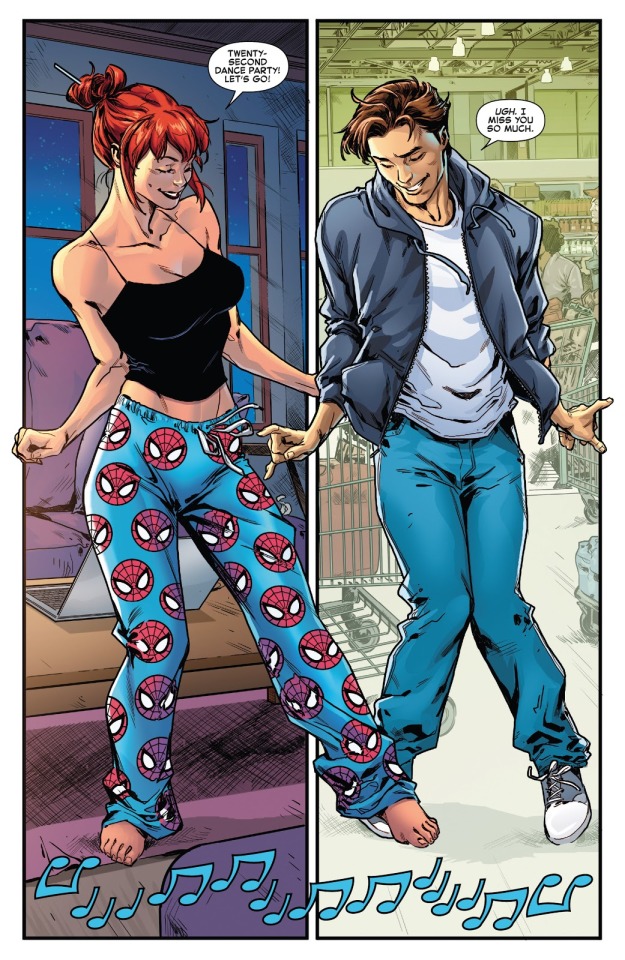
Its only relevance to this analysis is to exemplify some ways in which Williams nails Mary Jane’s character.
She’s flirtatious, she’s vibrant, she loves to dance, she loves to party, she can get the overly serious and often angst ridden Peter to emerge from his shell. Combined with MJ’s savvy earlier in the story, her tenaciousness and references to old continuity I can absolutely understand why Williams seemed like a good pick for the project.
But it’s moments like these that frustrate me about this comic (and I suspect the series going forward). It’s not that Williams fundamentally misunderstands Mary Jane but she drops the ball in a few places. Unfortunately those include drops that are so huge that they break the entire story. At least that will be the case if she doesn’t fill in the holes in her narrative.
The end result though is an extremely mixed bag wherein you have logic holes and mischaracterization so bad it debatably counts as (unintentional) character assassination but at the same time some of the absolute best Mary Jane or Mysterio moments ever! The 20-second dance party is going to be fondly remembered by every Mary Jane fan and MJ/Peter shipper forevermore, and rightly so.
But equally, unless properly justified in the future, MJ knowingly teaming up with Mysterio deserves to go down as one of the all time worst out of character moments for her ever.
The final relevant thing from the issue to talk about is the last page. It entails the Vulture’s gang of villains (the Savage Six) reading an article about the Mysterio biopic and deciding to head for L.A.
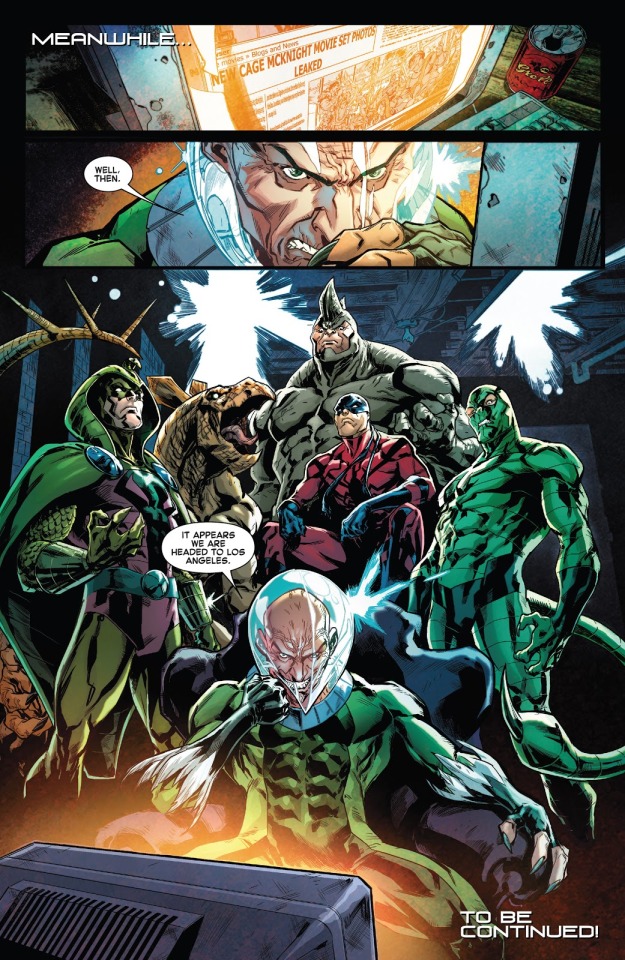
This is only really relevant for two reasons.
The first is the set up it supplies for future issues.
The second is that the article specifically talks about leaked set photos.
This further plays into the confusing nature of Mysterio’s scheme. He wants the media interest to act as a form of publicity (arguably this leak is an example of that) but he also has current villains on his staff. Wouldn’t the press be likely to find out about that and thereby jeopardize the project?
Reputation for authenticity or not, that’s extremely illegal.
With aaaaaaaall that said it’s time to move onto dissecting the status quo set up by this issue.
It’s all subject to change of course. Williams might address each and every problem eloquently at some point. But taking it at face value I am going to dedicate one (or more…) instalment(s) of this essay series to exploring the problems presented by this premise.
*We will talk much more extensively about this in a future instalment I promise you.
**By the way I don’t quite understand what MJ is asking her character to be rewritten into. She asks why she’s fighting without super powers but then says she should already be doing that in the story and that this is how she falls in love with the hero?????????????????????? Maybe I’m being dense but that just wasn’t clearly communicated to the readers).
Previous Part
Next Part
Master Post
#Amazing Mary Jane#Leah Williams#mjwatsonedit#mary jane watson#Mary Jane Watson Parker#MJ Watson#Spider-Man#Carlos Gomez#Mysterio#quentin beck#Peter Parker#Savage Six#Adrian Toomes#X-Men#vulture#The Vulture
11 notes
·
View notes